- Privacy Policy
Buy Me a Coffee

Home » Research Topics – Ideas and Examples

Research Topics – Ideas and Examples
Table of Contents

Research Topic
Definition:
Research topic is a specific subject or area of interest that a researcher wants to investigate or explore in-depth through research. It is the overarching theme or question that guides a research project and helps to focus the research activities towards a clear objective.
How to Choose Research Topic
You can Choose a Research Topic by following the below guide:
Identify your Interests
One of the most important factors to consider when choosing a research topic is your personal interest. This is because you will be spending a considerable amount of time researching and writing about the topic, so it’s essential that you are genuinely interested and passionate about it. Start by brainstorming a list of potential research topics based on your interests, hobbies, or areas of expertise. You can also consider the courses that you’ve enjoyed the most or the topics that have stood out to you in your readings.
Review the Literature
Before deciding on a research topic, you need to understand what has already been written about it. Conducting a preliminary review of the existing literature in your field can help you identify gaps in knowledge, inconsistencies in findings, or unanswered questions that you can explore further. You can do this by reading academic articles, books, and other relevant sources in your field. Make notes of the themes or topics that emerge and use this information to guide your research question.
Consult with your Advisor
Your academic advisor or a mentor in your field can provide you with valuable insights and guidance on choosing a research topic. They can help you identify areas of interest, suggest potential research questions, and provide feedback on the feasibility of your research proposal. They can also direct you towards relevant literature and resources that can help you develop your research further.
Consider the Scope and Feasibility
The research topic you choose should be manageable within the time and resource constraints of your project. Be mindful of the scope of your research and ensure that you are not trying to tackle a topic that is too broad or too narrow. If your topic is too broad, you may find it challenging to conduct a comprehensive analysis, while if it’s too narrow, you may struggle to find enough material to support your research.
Brainstorm with Peers
Discussing potential research topics with your peers or colleagues can help you generate new ideas and perspectives. They may have insights or expertise that you haven’t considered, and their feedback can help you refine your research question. You can also join academic groups or attend conferences in your field to network with other researchers and get inspiration for your research.
Consider the Relevance
Choose a research topic that is relevant to your field of study and has the potential to contribute to the existing knowledge. You can consider the latest trends and emerging issues in your field to identify topics that are both relevant and interesting. Conducting research on a topic that is timely and relevant can also increase the likelihood of getting published or presenting your research at conferences.
Keep an Open Mind
While it’s essential to choose a research topic that aligns with your interests and expertise, you should also be open to exploring new ideas or topics that may be outside of your comfort zone. Consider researching a topic that challenges your assumptions or introduces new perspectives that you haven’t considered before. You may discover new insights or perspectives that can enrich your research and contribute to your growth as a researcher.
Components of Research Topic
A research topic typically consists of several components that help to define and clarify the subject matter of the research project. These components include:
- Research problem or question: This is the central issue or inquiry that the research seeks to address. It should be well-defined and focused, with clear boundaries that limit the scope of the research.
- Background and context: This component provides the necessary background information and context for the research topic. It explains why the research problem or question is important, relevant, and timely. It may also include a literature review that summarizes the existing research on the topic.
- Objectives or goals : This component outlines the specific objectives or goals that the research seeks to achieve. It should be clear and concise, and should align with the research problem or question.
- Methodology : This component describes the research methods and techniques that will be used to collect and analyze data. It should be detailed enough to provide a clear understanding of how the research will be conducted, including the sampling method, data collection tools, and statistical analyses.
- Significance or contribution : This component explains the significance or contribution of the research topic. It should demonstrate how the research will add to the existing knowledge in the field, and how it will benefit practitioners, policymakers, or society at large.
- Limitations: This component outlines the limitations of the research, including any potential biases, assumptions, or constraints. It should be transparent and honest about the potential shortcomings of the research, and how these limitations will be addressed.
- Expected outcomes or findings : This component provides an overview of the expected outcomes or findings of the research project. It should be realistic and based on the research objectives and methodology.
Purpose of Research Topic
The purpose of a research topic is to identify a specific area of inquiry that the researcher wants to explore and investigate. A research topic is typically a broad area of interest that requires further exploration and refinement through the research process. It provides a clear focus and direction for the research project, and helps to define the research questions and objectives. A well-defined research topic also helps to ensure that the research is relevant and useful, and can contribute to the existing body of knowledge in the field. Ultimately, the purpose of a research topic is to generate new insights, knowledge, and understanding about a particular phenomenon, issue, or problem.
Characteristics of Research Topic
some common characteristics of a well-defined research topic include:
- Relevance : A research topic should be relevant and significant to the field of study and address a current issue, problem, or gap in knowledge.
- Specificity : A research topic should be specific enough to allow for a focused investigation and clear understanding of the research question.
- Feasibility : A research topic should be feasible, meaning it should be possible to carry out the research within the given constraints of time, resources, and expertise.
- Novelty : A research topic should add to the existing body of knowledge by introducing new ideas, concepts, or theories.
- Clarity : A research topic should be clearly articulated and easy to understand, both for the researcher and for potential readers of the research.
- Importance : A research topic should be important and have practical implications for the field or society as a whole.
- Significance : A research topic should be significant and have the potential to generate new insights and understanding in the field.
Examples of Research Topics
Here are some examples of research topics that are currently relevant and in-demand in various fields:
- The impact of social media on mental health: With the rise of social media use, this topic has gained significant attention in recent years. Researchers could investigate how social media affects self-esteem, body image, and other mental health concerns.
- The use of artificial intelligence in healthcare: As healthcare becomes increasingly digitalized, researchers could explore the use of AI algorithms to predict and prevent disease, optimize treatment plans, and improve patient outcomes.
- Renewable energy and sustainable development: As the world seeks to reduce its carbon footprint, researchers could investigate the potential of renewable energy sources such as wind and solar power, and how these technologies can be integrated into existing infrastructure.
- The impact of workplace diversity and inclusion on employee productivity: With an increasing focus on diversity and inclusion in the workplace, researchers could investigate how these factors affect employee morale, productivity, and retention.
- Cybersecurity and data privacy: As data breaches and cyber attacks become more common, researchers could explore new methods of protecting sensitive information and preventing malicious attacks.
- T he impact of mindfulness and meditation on stress reduction: As stress-related health issues become more prevalent, researchers could investigate the effectiveness of mindfulness and meditation practices on reducing stress and improving overall well-being.
Research Topics Ideas
Here are some Research Topics Ideas from different fields:
- The impact of social media on mental health and well-being.
- The effectiveness of various teaching methods in improving academic performance in high schools.
- The role of AI and machine learning in healthcare: current applications and future potentials.
- The impact of climate change on wildlife habitats and conservation efforts.
- The effects of video game violence on aggressive behavior in young adults.
- The effectiveness of mindfulness-based stress reduction techniques in reducing anxiety and depression.
- The impact of technology on human relationships and social interactions.
- The role of exercise in promoting physical and mental health in older adults.
- The causes and consequences of income inequality in developed and developing countries.
- The effects of cultural diversity in the workplace on job satisfaction and productivity.
- The impact of remote work on employee productivity and work-life balance.
- The relationship between sleep patterns and cognitive functioning.
- The effectiveness of online learning versus traditional classroom learning.
- The role of government policies in promoting renewable energy adoption.
- The effects of childhood trauma on mental health in adulthood.
- The impact of social media on political participation and civic engagement.
- The effectiveness of cognitive-behavioral therapy in treating anxiety disorders.
- The relationship between nutrition and cognitive functioning.
- The impact of gentrification on urban communities.
- The effects of music on mood and emotional regulation.
- The impact of microplastics on marine ecosystems and food webs.
- The role of artificial intelligence in detecting and preventing cyberattacks.
- The effectiveness of mindfulness-based interventions in managing chronic pain.
- The relationship between personality traits and job satisfaction.
- The effects of social isolation on mental and physical health in older adults.
- The impact of cultural and linguistic diversity on healthcare access and outcomes.
- The effectiveness of psychotherapy in treating depression and anxiety in adolescents.
- The relationship between exercise and cognitive aging.
- The effects of social media on body image and self-esteem.
- The role of corporate social responsibility in promoting sustainable business practices.
- The impact of mindfulness meditation on attention and focus in children.
- The relationship between political polarization and media consumption habits.
- The effects of urbanization on mental health and well-being.
- The role of social support in managing chronic illness.
- The impact of social media on romantic relationships and dating behaviors.
- The effectiveness of behavioral interventions in promoting physical activity in sedentary adults.
- The relationship between sleep quality and immune function.
- The effects of workplace diversity and inclusion programs on employee retention.
- The impact of climate change on global food security.
- The role of music therapy in improving communication and social skills in individuals with autism spectrum disorder.
- The impact of cultural values on the development of mental health stigma.
- The effectiveness of mindfulness-based stress reduction techniques in reducing burnout in healthcare professionals.
- The relationship between social media use and body dissatisfaction among adolescents.
- The effects of nature exposure on cognitive functioning and well-being.
- The role of peer mentoring in promoting academic success in underrepresented student populations.
- The impact of neighborhood characteristics on physical activity and obesity.
- The effectiveness of cognitive rehabilitation interventions in improving cognitive functioning in individuals with traumatic brain injury.
- The relationship between organizational culture and employee job satisfaction.
- The effects of cultural immersion experiences on intercultural competence development.
- The role of assistive technology in promoting independence and quality of life for individuals with disabilities.
- The impact of workplace design on employee productivity and well-being.
- The impact of digital technologies on the music industry and artist revenues.
- The effectiveness of cognitive behavioral therapy in treating insomnia.
- The relationship between social media use and body weight perception among young adults.
- The effects of green spaces on mental health and well-being in urban areas.
- The role of mindfulness-based interventions in reducing substance use disorders.
- The impact of workplace bullying on employee turnover and job satisfaction.
- The effectiveness of animal-assisted therapy in treating mental health disorders.
- The relationship between teacher-student relationships and academic achievement.
- The effects of social support on resilience in individuals experiencing adversity.
- The role of cognitive aging in driving safety and mobility.
- The effectiveness of psychotherapy in treating post-traumatic stress disorder (PTSD).
- The relationship between social media use and sleep quality.
- The effects of cultural competency training on healthcare providers’ attitudes and behaviors towards diverse patient populations.
- The role of exercise in preventing chronic diseases such as type 2 diabetes and cardiovascular disease.
- The impact of the gig economy on job security and worker rights.
- The effectiveness of art therapy in promoting emotional regulation and coping skills in children and adolescents.
- The relationship between parenting styles and child academic achievement.
- The effects of social comparison on well-being and self-esteem.
- The role of nutrition in promoting healthy aging and longevity.
- The impact of gender diversity in leadership on organizational performance.
- The effectiveness of family-based interventions in treating eating disorders.
- The relationship between social media use and perceived loneliness among older adults.
- The effects of mindfulness-based interventions on pain management in chronic pain patients.
- The role of physical activity in preventing and treating depression.
- The impact of cultural differences on communication and conflict resolution in international business.
- The effectiveness of eye movement desensitization and reprocessing (EMDR) in treating anxiety disorders.
- The relationship between student engagement and academic success in higher education.
- The effects of discrimination on mental health outcomes in minority populations.
- The role of virtual reality in enhancing learning experiences.
- The impact of social media influencers on consumer behavior and brand loyalty.
- The effectiveness of acceptance and commitment therapy (ACT) in treating chronic pain.
- The relationship between social media use and body image dissatisfaction among men.
- The effects of exposure to nature on cognitive functioning and creativity.
- The role of spirituality in coping with illness and disability.
- The impact of automation on employment and job displacement.
- The effectiveness of dialectical behavior therapy (DBT) in treating borderline personality disorder.
- The relationship between teacher-student relationships and school attendance.
- The effects of mindfulness-based interventions on workplace stress and burnout.
- The role of exercise in promoting cognitive functioning and brain health in older adults.
- The impact of diversity and inclusion initiatives on organizational innovation and creativity.
- The effectiveness of cognitive remediation therapy in treating schizophrenia.
- The relationship between social media use and body dissatisfaction among women.
- The effects of exposure to natural light on mood and sleep quality.
- The role of spirituality in enhancing well-being and resilience in military personnel.
- The impact of artificial intelligence on job training and skill development.
- The effectiveness of interpersonal therapy (IPT) in treating depression.
- The relationship between parental involvement and academic achievement among low-income students.
- The effects of mindfulness-based interventions on emotional regulation and coping skills in trauma survivors.
- The role of nutrition in preventing and treating mental health disorders.
About the author
Muhammad Hassan
Researcher, Academic Writer, Web developer
You may also like

Data Collection – Methods Types and Examples

Delimitations in Research – Types, Examples and...

Research Process – Steps, Examples and Tips

Research Design – Types, Methods and Examples

Institutional Review Board – Application Sample...

Evaluating Research – Process, Examples and...

Choose Your Test
Sat / act prep online guides and tips, 113 great research paper topics.
General Education

One of the hardest parts of writing a research paper can be just finding a good topic to write about. Fortunately we've done the hard work for you and have compiled a list of 113 interesting research paper topics. They've been organized into ten categories and cover a wide range of subjects so you can easily find the best topic for you.
In addition to the list of good research topics, we've included advice on what makes a good research paper topic and how you can use your topic to start writing a great paper.
What Makes a Good Research Paper Topic?
Not all research paper topics are created equal, and you want to make sure you choose a great topic before you start writing. Below are the three most important factors to consider to make sure you choose the best research paper topics.
#1: It's Something You're Interested In
A paper is always easier to write if you're interested in the topic, and you'll be more motivated to do in-depth research and write a paper that really covers the entire subject. Even if a certain research paper topic is getting a lot of buzz right now or other people seem interested in writing about it, don't feel tempted to make it your topic unless you genuinely have some sort of interest in it as well.
#2: There's Enough Information to Write a Paper
Even if you come up with the absolute best research paper topic and you're so excited to write about it, you won't be able to produce a good paper if there isn't enough research about the topic. This can happen for very specific or specialized topics, as well as topics that are too new to have enough research done on them at the moment. Easy research paper topics will always be topics with enough information to write a full-length paper.
Trying to write a research paper on a topic that doesn't have much research on it is incredibly hard, so before you decide on a topic, do a bit of preliminary searching and make sure you'll have all the information you need to write your paper.
#3: It Fits Your Teacher's Guidelines
Don't get so carried away looking at lists of research paper topics that you forget any requirements or restrictions your teacher may have put on research topic ideas. If you're writing a research paper on a health-related topic, deciding to write about the impact of rap on the music scene probably won't be allowed, but there may be some sort of leeway. For example, if you're really interested in current events but your teacher wants you to write a research paper on a history topic, you may be able to choose a topic that fits both categories, like exploring the relationship between the US and North Korea. No matter what, always get your research paper topic approved by your teacher first before you begin writing.
113 Good Research Paper Topics
Below are 113 good research topics to help you get you started on your paper. We've organized them into ten categories to make it easier to find the type of research paper topics you're looking for.
Arts/Culture
- Discuss the main differences in art from the Italian Renaissance and the Northern Renaissance .
- Analyze the impact a famous artist had on the world.
- How is sexism portrayed in different types of media (music, film, video games, etc.)? Has the amount/type of sexism changed over the years?
- How has the music of slaves brought over from Africa shaped modern American music?
- How has rap music evolved in the past decade?
- How has the portrayal of minorities in the media changed?

Current Events
- What have been the impacts of China's one child policy?
- How have the goals of feminists changed over the decades?
- How has the Trump presidency changed international relations?
- Analyze the history of the relationship between the United States and North Korea.
- What factors contributed to the current decline in the rate of unemployment?
- What have been the impacts of states which have increased their minimum wage?
- How do US immigration laws compare to immigration laws of other countries?
- How have the US's immigration laws changed in the past few years/decades?
- How has the Black Lives Matter movement affected discussions and view about racism in the US?
- What impact has the Affordable Care Act had on healthcare in the US?
- What factors contributed to the UK deciding to leave the EU (Brexit)?
- What factors contributed to China becoming an economic power?
- Discuss the history of Bitcoin or other cryptocurrencies (some of which tokenize the S&P 500 Index on the blockchain) .
- Do students in schools that eliminate grades do better in college and their careers?
- Do students from wealthier backgrounds score higher on standardized tests?
- Do students who receive free meals at school get higher grades compared to when they weren't receiving a free meal?
- Do students who attend charter schools score higher on standardized tests than students in public schools?
- Do students learn better in same-sex classrooms?
- How does giving each student access to an iPad or laptop affect their studies?
- What are the benefits and drawbacks of the Montessori Method ?
- Do children who attend preschool do better in school later on?
- What was the impact of the No Child Left Behind act?
- How does the US education system compare to education systems in other countries?
- What impact does mandatory physical education classes have on students' health?
- Which methods are most effective at reducing bullying in schools?
- Do homeschoolers who attend college do as well as students who attended traditional schools?
- Does offering tenure increase or decrease quality of teaching?
- How does college debt affect future life choices of students?
- Should graduate students be able to form unions?

- What are different ways to lower gun-related deaths in the US?
- How and why have divorce rates changed over time?
- Is affirmative action still necessary in education and/or the workplace?
- Should physician-assisted suicide be legal?
- How has stem cell research impacted the medical field?
- How can human trafficking be reduced in the United States/world?
- Should people be able to donate organs in exchange for money?
- Which types of juvenile punishment have proven most effective at preventing future crimes?
- Has the increase in US airport security made passengers safer?
- Analyze the immigration policies of certain countries and how they are similar and different from one another.
- Several states have legalized recreational marijuana. What positive and negative impacts have they experienced as a result?
- Do tariffs increase the number of domestic jobs?
- Which prison reforms have proven most effective?
- Should governments be able to censor certain information on the internet?
- Which methods/programs have been most effective at reducing teen pregnancy?
- What are the benefits and drawbacks of the Keto diet?
- How effective are different exercise regimes for losing weight and maintaining weight loss?
- How do the healthcare plans of various countries differ from each other?
- What are the most effective ways to treat depression ?
- What are the pros and cons of genetically modified foods?
- Which methods are most effective for improving memory?
- What can be done to lower healthcare costs in the US?
- What factors contributed to the current opioid crisis?
- Analyze the history and impact of the HIV/AIDS epidemic .
- Are low-carbohydrate or low-fat diets more effective for weight loss?
- How much exercise should the average adult be getting each week?
- Which methods are most effective to get parents to vaccinate their children?
- What are the pros and cons of clean needle programs?
- How does stress affect the body?
- Discuss the history of the conflict between Israel and the Palestinians.
- What were the causes and effects of the Salem Witch Trials?
- Who was responsible for the Iran-Contra situation?
- How has New Orleans and the government's response to natural disasters changed since Hurricane Katrina?
- What events led to the fall of the Roman Empire?
- What were the impacts of British rule in India ?
- Was the atomic bombing of Hiroshima and Nagasaki necessary?
- What were the successes and failures of the women's suffrage movement in the United States?
- What were the causes of the Civil War?
- How did Abraham Lincoln's assassination impact the country and reconstruction after the Civil War?
- Which factors contributed to the colonies winning the American Revolution?
- What caused Hitler's rise to power?
- Discuss how a specific invention impacted history.
- What led to Cleopatra's fall as ruler of Egypt?
- How has Japan changed and evolved over the centuries?
- What were the causes of the Rwandan genocide ?

- Why did Martin Luther decide to split with the Catholic Church?
- Analyze the history and impact of a well-known cult (Jonestown, Manson family, etc.)
- How did the sexual abuse scandal impact how people view the Catholic Church?
- How has the Catholic church's power changed over the past decades/centuries?
- What are the causes behind the rise in atheism/ agnosticism in the United States?
- What were the influences in Siddhartha's life resulted in him becoming the Buddha?
- How has media portrayal of Islam/Muslims changed since September 11th?
Science/Environment
- How has the earth's climate changed in the past few decades?
- How has the use and elimination of DDT affected bird populations in the US?
- Analyze how the number and severity of natural disasters have increased in the past few decades.
- Analyze deforestation rates in a certain area or globally over a period of time.
- How have past oil spills changed regulations and cleanup methods?
- How has the Flint water crisis changed water regulation safety?
- What are the pros and cons of fracking?
- What impact has the Paris Climate Agreement had so far?
- What have NASA's biggest successes and failures been?
- How can we improve access to clean water around the world?
- Does ecotourism actually have a positive impact on the environment?
- Should the US rely on nuclear energy more?
- What can be done to save amphibian species currently at risk of extinction?
- What impact has climate change had on coral reefs?
- How are black holes created?
- Are teens who spend more time on social media more likely to suffer anxiety and/or depression?
- How will the loss of net neutrality affect internet users?
- Analyze the history and progress of self-driving vehicles.
- How has the use of drones changed surveillance and warfare methods?
- Has social media made people more or less connected?
- What progress has currently been made with artificial intelligence ?
- Do smartphones increase or decrease workplace productivity?
- What are the most effective ways to use technology in the classroom?
- How is Google search affecting our intelligence?
- When is the best age for a child to begin owning a smartphone?
- Has frequent texting reduced teen literacy rates?

How to Write a Great Research Paper
Even great research paper topics won't give you a great research paper if you don't hone your topic before and during the writing process. Follow these three tips to turn good research paper topics into great papers.
#1: Figure Out Your Thesis Early
Before you start writing a single word of your paper, you first need to know what your thesis will be. Your thesis is a statement that explains what you intend to prove/show in your paper. Every sentence in your research paper will relate back to your thesis, so you don't want to start writing without it!
As some examples, if you're writing a research paper on if students learn better in same-sex classrooms, your thesis might be "Research has shown that elementary-age students in same-sex classrooms score higher on standardized tests and report feeling more comfortable in the classroom."
If you're writing a paper on the causes of the Civil War, your thesis might be "While the dispute between the North and South over slavery is the most well-known cause of the Civil War, other key causes include differences in the economies of the North and South, states' rights, and territorial expansion."
#2: Back Every Statement Up With Research
Remember, this is a research paper you're writing, so you'll need to use lots of research to make your points. Every statement you give must be backed up with research, properly cited the way your teacher requested. You're allowed to include opinions of your own, but they must also be supported by the research you give.
#3: Do Your Research Before You Begin Writing
You don't want to start writing your research paper and then learn that there isn't enough research to back up the points you're making, or, even worse, that the research contradicts the points you're trying to make!
Get most of your research on your good research topics done before you begin writing. Then use the research you've collected to create a rough outline of what your paper will cover and the key points you're going to make. This will help keep your paper clear and organized, and it'll ensure you have enough research to produce a strong paper.
What's Next?
Are you also learning about dynamic equilibrium in your science class? We break this sometimes tricky concept down so it's easy to understand in our complete guide to dynamic equilibrium .
Thinking about becoming a nurse practitioner? Nurse practitioners have one of the fastest growing careers in the country, and we have all the information you need to know about what to expect from nurse practitioner school .
Want to know the fastest and easiest ways to convert between Fahrenheit and Celsius? We've got you covered! Check out our guide to the best ways to convert Celsius to Fahrenheit (or vice versa).
These recommendations are based solely on our knowledge and experience. If you purchase an item through one of our links, PrepScholar may receive a commission.

Christine graduated from Michigan State University with degrees in Environmental Biology and Geography and received her Master's from Duke University. In high school she scored in the 99th percentile on the SAT and was named a National Merit Finalist. She has taught English and biology in several countries.
Student and Parent Forum
Our new student and parent forum, at ExpertHub.PrepScholar.com , allow you to interact with your peers and the PrepScholar staff. See how other students and parents are navigating high school, college, and the college admissions process. Ask questions; get answers.

Ask a Question Below
Have any questions about this article or other topics? Ask below and we'll reply!
Improve With Our Famous Guides
- For All Students
The 5 Strategies You Must Be Using to Improve 160+ SAT Points
How to Get a Perfect 1600, by a Perfect Scorer
Series: How to Get 800 on Each SAT Section:
Score 800 on SAT Math
Score 800 on SAT Reading
Score 800 on SAT Writing
Series: How to Get to 600 on Each SAT Section:
Score 600 on SAT Math
Score 600 on SAT Reading
Score 600 on SAT Writing
Free Complete Official SAT Practice Tests
What SAT Target Score Should You Be Aiming For?
15 Strategies to Improve Your SAT Essay
The 5 Strategies You Must Be Using to Improve 4+ ACT Points
How to Get a Perfect 36 ACT, by a Perfect Scorer
Series: How to Get 36 on Each ACT Section:
36 on ACT English
36 on ACT Math
36 on ACT Reading
36 on ACT Science
Series: How to Get to 24 on Each ACT Section:
24 on ACT English
24 on ACT Math
24 on ACT Reading
24 on ACT Science
What ACT target score should you be aiming for?
ACT Vocabulary You Must Know
ACT Writing: 15 Tips to Raise Your Essay Score
How to Get Into Harvard and the Ivy League
How to Get a Perfect 4.0 GPA
How to Write an Amazing College Essay
What Exactly Are Colleges Looking For?
Is the ACT easier than the SAT? A Comprehensive Guide
Should you retake your SAT or ACT?
When should you take the SAT or ACT?
Stay Informed
Get the latest articles and test prep tips!
Looking for Graduate School Test Prep?
Check out our top-rated graduate blogs here:
GRE Online Prep Blog
GMAT Online Prep Blog
TOEFL Online Prep Blog
Holly R. "I am absolutely overjoyed and cannot thank you enough for helping me!”
Selecting a Research Topic: Overview
- Refine your topic
- Background information & facts
- Writing help
Here are some resources to refer to when selecting a topic and preparing to write a paper:
- MIT Writing and Communication Center "Providing free professional advice about all types of writing and speaking to all members of the MIT community."
- Search Our Collections Find books about writing. Search by subject for: english language grammar; report writing handbooks; technical writing handbooks
- Blue Book of Grammar and Punctuation Online version of the book that provides examples and tips on grammar, punctuation, capitalization, and other writing rules.
- Select a topic
Choosing an interesting research topic is your first challenge. Here are some tips:
- Choose a topic that you are interested in! The research process is more relevant if you care about your topic.
- If your topic is too broad, you will find too much information and not be able to focus.
- Background reading can help you choose and limit the scope of your topic.
- Review the guidelines on topic selection outlined in your assignment. Ask your professor or TA for suggestions.
- Refer to lecture notes and required texts to refresh your knowledge of the course and assignment.
- Talk about research ideas with a friend. S/he may be able to help focus your topic by discussing issues that didn't occur to you at first.
- WHY did you choose the topic? What interests you about it? Do you have an opinion about the issues involved?
- WHO are the information providers on this topic? Who might publish information about it? Who is affected by the topic? Do you know of organizations or institutions affiliated with the topic?
- WHAT are the major questions for this topic? Is there a debate about the topic? Are there a range of issues and viewpoints to consider?
- WHERE is your topic important: at the local, national or international level? Are there specific places affected by the topic?
- WHEN is/was your topic important? Is it a current event or an historical issue? Do you want to compare your topic by time periods?
Table of contents
- Broaden your topic
- Information Navigator home
- Sources for facts - general
- Sources for facts - specific subjects
Start here for help
Ask Us Ask a question, make an appointment, give feedback, or visit us.
- Next: Refine your topic >>
- Last Updated: Jul 30, 2021 2:50 PM
- URL: https://libguides.mit.edu/select-topic
Main navigation
- For supervisees
- For supervisors
- Supervision Snapshots
- Ask an Associate Dean
- Graduate Mentorship
- Finding a Supervisor
- Purposes of the graduate degree
- Starting out
- Integrity and ethical practice in conduct of research
- Developing a conception of research
Defining the research topic
- Improving reading and writing skills
- Developing Transferable Skills
- Presenting at seminars and conferences
- Publishing during graduate studies
- Comprehensive exams
- Dissertation and thesis exams
- Practical advice
- Ideas for reflection
Conceptualizing your research topic
Conceptualizing a research topic entails formulating a “defensible and researchable” research question . Conducting a literature search as one of the first steps in a graduate degree is often quite helpful as published peer-reviewed research articles are key to identify knowledge gaps in current literature. Thus, students can design and phrase their research projects to aim to address these research gaps.
Elements of a good research topic
- Interesting: topic represents an area of deep interest for the researcher
- Original : for PhD students, the topic can produce an original contribution to knowledge
- Manageable: research question could be answered within the degree’s recommended time frame (see time limitation ).
At McGill, PhD students are usually expected to have a sufficiently defined research topic by the time of the comprehensive exam .
Seminar presentations can help with topic definition and project planning
Many experienced supervisors and successful PhD students suggest that preparing a research proposal for presentation at a seminar within six months of commencement helps with focusing on the topic. Here are some suggested questions:
- What is it that you want to find answers for?
- Why is it important that this be researched?
- What impact will this research have?
- How will you go about researching this?
Read critically to identify gaps in the field and understand different research methods
Critical reading involves developing an understanding of the knowledge and gaps in the field and being able to critique different research methods, methodologies and epistemologies.
Try concept mapping to visualize and organize links between ideas
Concept mapping: a practical strategy for students and researchers starting a project. It helps to identify areas of importance as well as possibilities for the exploration and analysis of such areas.
Concept maps are helpful as a means of focusing discussion on the topic or research question because they offer a visual approach to creating relationships among concepts . More information about concept mapping can be found at the Institute for Human and Machine Cognition's page on Constructing your first concept map .
- A concept map showing the main components of a concept map , from Novak & Canas (2008) .
If the student makes a concept map, this can form the basis of different discussions between the student and supervisor.
How important is motivation for topic selection?
Most graduate students have a general idea about what they would like to research. Depending on supervisors and disciplines, a student may be "given" a specific research topic or a list of topics to choose from or be asked to generate a topic based on her or his prior knowledge and experience. In either situation, it is a good idea to talk with others – supervisors, students, colleagues, peers, even friends and family – about possible choices, since a research topic is something most students will commit to for the rest of their degree.
Point to reflect on
- What questions, topics or methodologies are you passionate about? Why are you passionate about them (e.g., personal interest or curiosity, potential applications to help others or the environment)?
- Is it possible to answer your desired question within the time frame of a graduate degree? If not, is it possible to choose a portion of this topic to investigate during your graduate studies?
- Do you get more motivated from knowing exactly what you’re going to do, or from the excitement of unexpected discoveries or research trajectories? How can you select a topic and plan your project to better suit your sources of motivation See Staying motivated for additional resources
Steps to refine the research focus
- Identify the boundaries of the research areas and the gaps in the field .
- Make a list of possible research ideas within a topic.
- Discuss these ideas with others (e.g., peers, colleagues, professors, mentors). This can provide opportunities for receiving advice based on past experiences, additional ideas, or opportunities for collaboration.
- Reduce the list to two ideas : a first choice and a backup. Having a backup is useful in the event that the first choice is found to be inappropriate for the time restriction, require unattainable resources, or be otherwise not feasible.
- Brainstorm as many ideas, questions, possible problems, and any other thoughts relevant to the first choice.
- Narrow down these ideas into a more precise focus by considering feasibility (e.g., time, requires resources), interest, and significance. The resulting idea should complete the sentence “The purpose of this project is…”
- Refer back to the brainstorming and remove anything not relevant to the purpose statement. Add any new relevant ideas. Use these ideas as well as the purpose statement to create a list of researchable questions . Be sure to define key terms and consider required resources, including the characteristics of the participants if applicable.
- Create a project outline. Consider what information or data will be needed and how it can be obtained.
Adapted from Wisker (2005, p. 83) and Bell & Waters (2014)
Bell, J., & Waters, S. (2014). Doing your research project: A guide for first-time researchers . New York, NY: McGraw-Hill Education.
Novak, J. D., & Cañas, A. J. (2008). The theory underlying concept maps and how to construct and use them. Institute for Human and Machine Cognition . Retrieved from http://cmap.ihmc.us/docs/theory-of-concept-maps
Wisker, G. (2005). The good supervisor: Supervising postgraduate and undergraduate research for doctoral theses and dissertations . Basingstoke: Palgrave Macmillan.
This work is licensed under a Creative Commons Attribution Non-Commercial 4.0 International License . Graduate and Postdoctoral Studies, McGill University .
Department and University Information
Graduate and postdoctoral studies.


TODAY'S HOURS:
Research Topic Ideas
Getting started, 1. brainstorming for a topic, 2. read general background information, 3. focus your topic, more research help.
- Area & Interdisciplinary Studies
- Behavioral & Social Sciences
- Business, Economics, & Management
- Current Events and Controversial Issues
- Education & Social Work
- Health Sciences
- Natural and Physical Sciences
This guide provides you with a list of topic ideas (by subject or academic discipline) which could be developed into a research paper or project. It is not an all-inclusive list, but a list developed over time with input from faculty and students.
It is intended to offer suggestions only.
This is NOT a guide to help you research a topic. It is only intended to provide ideas for a paper.
The ability to develop a good research topic is an important skill. An instructor may assign you a specific topic, but most often instructors require you to select your own topic of interest. When deciding on a topic, there are a few things that you will need to do:
- Brainstorm for ideas.
- Choose a topic that will enable you to read and understand the articles and books you find.
- Ensure that the topic is manageable and that material is available.
- Make a list of key words.
- Be flexible. You may have to broaden or narrow your topic to fit your assignment or the sources you find.
Selecting a good topic may not be easy. It must be narrow and focused enough to be interesting, yet broad enough to find adequate information. Before selecting your final topic, make sure you know what your final project should look like. Each class or instructor will likely require a different format or style of research project.
Choose a topic that interests you. Use the following questions to help generate topic ideas.
- Do you have a strong opinion on a current social or political controversy?
- Did you read or see a news story recently that has piqued your interest or made you angry or anxious?
- Do you have a personal issue, problem, or interest that you would like to know more about?
- Is there an aspect of a class that you are interested in learning more about?
Write down any key words or concepts that may be of interest to you. These terms can be helpful in your searching and used to form a more focused research topic.
Be aware of overused ideas when deciding a topic. You may wish to avoid topics such as abortion, gun control, teen pregnancy, or suicide unless you feel you have a unique approach to the topic. Ask the instructor for ideas if you feel you are stuck or need additional guidance.
Sometimes using a Concept Map can help you come up with directions to take your research.
- Topic Concept Map Download and print this PDF to create a concept map for your topic. Put your main topic in the middle circle and then put ideas related to your topic on the lines radiating from the circle.
Read a general encyclopedia article on the top two or three topics you are considering.
Reading a broad summary enables you to get an overview of the topic and see how your idea relates to broader, narrower, and related issues. It also provides a great source for finding words commonly used to describe the topic. These keywords may be very useful to your later research.
If you can't find an article on your topic, try using broader terms and ask for help from a librarian.
The databases listed below are good places to find general information. The library's print reference collection can also be useful and is located on the third floor of the library.
Authoritative coverage of thousands of topics in all areas of study.
Encyclopaedia Britannica's latest article database (including hundreds of articles not found in the print edition), Merriam-Webster's Collegiate Dictionary and Thesaurus, and the Britannica Book of the Year (1994-present), with thousands of web links selected by editors. Updated daily.
Fully indexed, cross-searchable database of over 400 dictionary, language reference, and subject reference works published by Oxford University Press. Includes subject reference works in the humanities, social sciences, and science--both "Quick Reference" titles (concise dictionaries, etc.) and larger "Reference Library" titles (multi-volume encyclopedias, etc.).
Covers anthropology, communication, education, geography, health, history, law, management, politics, psychology, and sociology.
Concise introductions to a diverse range of subject areas in the sciences, social sciences, and arts and humanities.
Keep it manageable and be flexible. If you start doing more research and not finding enough sources that support your thesis, you may need to adjust your topic.
A topic will be very difficult to research if it is too broad or narrow. One way to narrow a broad topic such as "the environment" is to limit your topic. Some common ways to limit a topic are:
- by geographic area
Example: What environmental issues are most important in the Southwestern United States?
- by time frame:
Example: What are the most prominent environmental issues of the last 10 years?
- by discipline
Example: How does environmental awareness effect business practices today?
- by population group
Example: What are the effects of air pollution on senior citizens?
Remember that a topic may be too difficult to research if it is too:
- locally confined - Topics this specific may only be covered in local newspapers and not in scholarly articles.
Example: What sources of pollution affect the Genesee County water supply?
- recent - If a topic is quite recent, books or journal articles may not be available, but newspaper or magazine articles may. Also, websites related to the topic may or may not be available.
- broadly interdisciplinary - You could be overwhelmed with superficial information.
Example: How can the environment contribute to the culture, politics and society of the Western United States?
- popular - You will only find very popular articles about some topics such as sports figures and high-profile celebrities and musicians.
Putting your topic in the form of a question will help you focus on what type of information you want to collect.
If you have any difficulties or questions with focusing your topic, discuss the topic with your instructor, or with a librarian.
For more help with the research help, please see our Research Help Guides:
- Research Process by Liz Svoboda Last Updated Mar 1, 2024 6323 views this year
- Primary Sources for Historical Research: A Library Guide by Reference Librarians Last Updated Mar 28, 2024 65 views this year
- Understanding Journals: Peer-Reviewed, Scholarly, & Popular by Liz Svoboda Last Updated Jan 10, 2024 1012 views this year
- Identifying Information Sources by Liz Svoboda Last Updated Mar 13, 2024 1497 views this year
- Next: Area & Interdisciplinary Studies >>
- Last Updated: Mar 1, 2024 1:06 PM
- URL: https://libguides.umflint.edu/topics

The Plagiarism Checker Online For Your Academic Work
Start Plagiarism Check
Editing & Proofreading for Your Research Paper
Get it proofread now
Online Printing & Binding with Free Express Delivery
Configure binding now
- Academic essay overview
- The writing process
- Structuring academic essays
- Types of academic essays
- Academic writing overview
- Sentence structure
- Academic writing process
- Improving your academic writing
- Titles and headings
- APA style overview
- APA citation & referencing
- APA structure & sections
- Citation & referencing
- Structure and sections
- APA examples overview
- Commonly used citations
- Other examples
- British English vs. American English
- Chicago style overview
- Chicago citation & referencing
- Chicago structure & sections
- Chicago style examples
- Citing sources overview
- Citation format
- Citation examples
- College essay overview
- Application
- How to write a college essay
- Types of college essays
- Commonly confused words
- Definitions
- Dissertation overview
- Dissertation structure & sections
- Dissertation writing process
- Graduate school overview
- Application & admission
- Study abroad
- Master degree
- Harvard referencing overview
- Language rules overview
- Grammatical rules & structures
- Parts of speech
- Punctuation
- Methodology overview
- Analyzing data
- Experiments
- Observations
- Inductive vs. Deductive
- Qualitative vs. Quantitative
- Types of validity
- Types of reliability
- Sampling methods
- Theories & Concepts
- Types of research studies
- Types of variables
- MLA style overview
- MLA examples
- MLA citation & referencing
- MLA structure & sections
- Plagiarism overview
- Plagiarism checker
- Types of plagiarism
- Printing production overview
- Research bias overview
- Types of research bias
- Example sections
- Types of research papers
- Research process overview
- Problem statement
- Research proposal
- Research topic
- Statistics overview
- Levels of measurment
- Frequency distribution
- Measures of central tendency
- Measures of variability
- Hypothesis testing
- Parameters & test statistics
- Types of distributions
- Correlation
- Effect size
- Hypothesis testing assumptions
- Types of ANOVAs
- Types of chi-square
- Statistical data
- Statistical models
- Spelling mistakes
- Tips overview
- Academic writing tips
- Dissertation tips
- Sources tips
- Working with sources overview
- Evaluating sources
- Finding sources
- Including sources
- Types of sources
Your Step to Success
Plagiarism Check within 10min
Printing & Binding with 3D Live Preview
Research Topics
How do you like this article cancel reply.
Save my name, email, and website in this browser for the next time I comment.

Inhaltsverzeichnis
- 1 Definition: Research Topics
- 3 Finding Research Topics
- 4 Defining Good Research Topics
- 5 Academic Writing Research Topics
- 6 Examples of Research Topics
- 7 In a Nutshell
Definition: Research Topics
A research topic is the subject or issue that forms the basis of a research paper. It is a well-defined subject the researcher is interested in. While it can be phrased as a question, you are not required to do so. The research then addresses the question. It can also be phrased both as a research question and a hypothesis.
The purpose of this article is to help you understand what research topics are and how they are used to conduct good research. It covers the characteristics of good research topics and provides information on and techniques for coming up with good research topics. The importance of research topics in academic writing is explained and some examples of research topics are listed.
How do you come up with ideas for suitable research topics?
Rational thinking and creative techniques are two key methods you can use to generate research ideas. You can use either of the techniques, or you can try both techniques and then decide which one you find more useful for your research. Both concepts are further discussed later in this article.
Tip: Keep in mind that you’ll need to create research questions based on your topic later on. It’s ok to begin with vague ideas, but later on you need to focus on a specific area of a topic.
How do you refine your research topic ideas?
The Delphi technique is an approach that many students have found useful for refining their research ideas. Usually, a number of people who are interested in the research are assembled to help generate and select more refined research topics. The next step will be to refine your ideas into a research question . This will require you to conduct more research on topics or issues that you found interesting during the research topic deciding phase.
What are the main elements of a research proposal?
A research proposal consists of an appropriate title that mirrors the content of the proposal; a background to justify the need for the research; a statement on what the research is meant to achieve. A section should be dedicated to the methods that will be adopted in order to achieve the research objectives within the expected timeframe. A section on resource considerations will help convince the reader about the feasibility of the research. This should be followed by a list of references.
How do you propose research topics?
Writing helps organize our ideas into coherent statements. For inspiration, check out some research proposal examples . The draft proposal should be discussed with your thesis supervisor or teaching assistant, who can advise you on how the proposal might be amended if necessary, so that the research can be completed within the proposed timeframe. This is of particular importance if the proposal has to be presented for funding or to an academic research committee for approval.
What defines a good research topic?
You’re the one who has to write the research paper or thesis, so it’s vital that YOU are interested in the topic that you’re researching. Your research topic shouldn’t be too vague. But in saying that, you also need to ensure that you’re able to write about your topic within the time frame provided. You need to be able to formulate your topic into a research question and a thesis statement later on.
Finding Research Topics
If done using a systematic approach, finding research topics can be interesting. A range of techniques involving rational as well as creative thinking are used to find a research topic.
Brainstorming
This is a problem-solving technique which generates best results when carried out as a group, but it can also be done by an individual. Find a quiet place to work and write down a problem related to your lectures or curriculum that interests you and of which you have some prior knowledge.
If you are working in a group, members can make suggestions regarding the problem. Make a note of all the suggestions and include all contributions, however wild they may be. Review each of the suggestions with your group and select the ones that most appeal to you. You may arrange discussing these suggestions with your thesis supervisor or the teaching assistant in charge of your project if needed.
Inspiration from your teachers
Project leaders, teaching assistants, professional groups and practitioners in your field will often have project ideas they are happy to share. They might come up with good research topics; just be sure to document the ideas discussed so that you can remember to further explore them on your own.
Literature search
Articles, reports in academic journals and books are all useful sources of research topics. Review articles in particular often indicate areas in which more research may be required. Most recently published reports usually contain recommendations which can form the basis of further research, and books contain an overview of research already undertaken, in addition to suggesting new areas to explore for further research.
Relevance trees
This technique involves generating topics on the basis of a broad concept. Each of these topics constitutes an independent branch which can yield sub-branches. You can review these sub-branches and combine some of them to come up with new research topics. Your project supervisor or teaching assistant may be of help in selecting a final topic from the shortlisted ones if you cannot narrow your choice down to one topic.
Looking inwards
Another way of finding a research topic is to review the assignments you have already completed and select the ones you received good grades in. These are the ones in which you are already knowledgeable. They will provide you with possibilities for further research.
Defining Good Research Topics
A good research topic should have well defined objectives. Selecting a research topic which you will be interested in for the entire research duration is vital. If you have only a vague interest in the topic, it will be difficult to excel on such a topic. Therefore, you should have a genuine interest in the research topic you have chosen.
Make sure you possess the required skills and resources, or that you can develop the capability that is necessary to research the topic within the given timeframe. You should also be certain that you can access the data you will need to collect in the course of the research. Your research topic should be one you are familiar with and in which you have the capacity to produce a well-written final research report.
TIP: Always use transition words to properly connect the sentences and paragraphs in your thesis or essay.
Academic Writing Research Topics
Academic writing is a style of expression that defines the intellectual boundaries of a discipline. It focuses on a research problem and conveys an accepted interpretation of concepts or complex ideas. Research topics are germane to academic writing because they proffer rigorous arguments that can convince a reader to reconsider previously accepted position on a topic.
Examples of Research Topics
Previous research topics can serve as sources of inspiration for finding new research topics. Some examples of different research topics include: • Media and communications research paper topics • Environmental research paper topics • Business research paper topics
Depending on your field of study, looking at past projects can be very helpful in your search for new research topics.
In a Nutshell
- A research topic is a well-defined subject the researcher is interested in.
- Rational thinking and creative techniques are two methods you can use to generate research ideas.
- Techniques to find good research topics include brainstorming, getting inspiration from your teachers, using relevance trees, doing a literature search or looking inwards.
- You should have a genuine interest in the research topic you have chosen.
We use cookies on our website. Some of them are essential, while others help us to improve this website and your experience.
- External Media
Individual Privacy Preferences
Cookie Details Privacy Policy Imprint
Here you will find an overview of all cookies used. You can give your consent to whole categories or display further information and select certain cookies.
Accept all Save
Essential cookies enable basic functions and are necessary for the proper function of the website.
Show Cookie Information Hide Cookie Information
Statistics cookies collect information anonymously. This information helps us to understand how our visitors use our website.
Content from video platforms and social media platforms is blocked by default. If External Media cookies are accepted, access to those contents no longer requires manual consent.
Privacy Policy Imprint
info This is a space for the teal alert bar.
notifications This is a space for the yellow alert bar.

Research Process
- Brainstorming
- Explore Google This link opens in a new window
- Explore Web Resources
- Explore Background Information
- Explore Books
- Explore Scholarly Articles
- Narrowing a Topic
- Primary and Secondary Resources
- Academic, Popular & Trade Publications
- Scholarly and Peer-Reviewed Journals
- Grey Literature
- Clinical Trials
- Evidence Based Treatment
- Scholarly Research
- Database Research Log
- Search Limits
- Keyword Searching
- Boolean Operators
- Phrase Searching
- Truncation & Wildcard Symbols
- Proximity Searching
- Field Codes
- Subject Terms and Database Thesauri
- Reading a Scientific Article
- Website Evaluation
- Article Keywords and Subject Terms
- Cited References
- Citing Articles
- Related Results
- Search Within Publication
- Database Alerts & RSS Feeds
- Personal Database Accounts
- Persistent URLs
- Literature Gap and Future Research
- Web of Knowledge
- Annual Reviews
- Systematic Reviews & Meta-Analyses
- Finding Seminal Works
- Exhausting the Literature
- Finding Dissertations
- Researching Theoretical Frameworks
- Research Methodology & Design
- Tests and Measurements
- Organizing Research & Citations This link opens in a new window
- Scholarly Publication
- Learn the Library This link opens in a new window
Finding a Research Topic
Which step of the research process takes the most time?
A. Finding a topic B. Researching a topic C. Both
How did you answer the above question? Do you spend most of your efforts actually researching a topic, or do you spend a lot of time and energy finding a topic? Ideally, you’ll want to spend fairly equal amounts of effort on both. Finding an appropriate and manageable topic can sometimes be just as hard as researching a topic.
A good research topic will have a body of related research which is accessible and manageable. Identifying a topic with these characteristics at the beginning of the research process will ultimately save you time.
Finding a research topic that is interesting, relevant, feasible, and worthy of your time may take substantial effort so you should be prepared to invest your time accordingly. Considering your options, doing some background work on each option, and ultimately settling on a topic that is manageable will spare you many of the frustrations that come from attempting research on a topic that, for whatever reason, may not be appropriate.
Remember that as you are searching for a research topic you will need to be able to find enough information about your topic(s) in a book or scholarly journal. If you can only find information about your topic(s) in current event sources (newspapers, magazines, etc.) then the topic might be too new to have a large body of published scholarly information. If this is the case, you may want to reconsider the topic(s).
So how do you find a research topic? Unfortunately there’s no directory of topics that you pick and choose from, but there are a few relatively easy techniques that you can use to find a relevant and manageable topic. A good starting point may be to view the Library's Resources for Finding a Research Topic Workshop below.
The sub-pages in this section (on the left-hand menu) offer various tips for where and how to locate resources to develop your research topic. And for additional information on selecting a research topic, see the resources below.
- Defining a Topic - SAGE Research Methods
- Develop My Research Idea - Academic Writer Note: You MUST create an Academic Writer account AND start a paper in order to access this tool. Once you have done so, open a paper and click Research Lab Book in the left navigation menu.
- The Process for Developing Questions - ASC Guide
Resources for Finding a Research Topic Workshop
This workshop will introduce you to library resources which can be used to locate potential topics for a research paper or dissertation. This workshop explores websites, reference books, and scholarly articles, as well as review criteria to consider when selecting a topic.
- Resources for Finding a Research Topic Workshop Outline
Was this resource helpful?
- << Previous: Home
- Next: Brainstorming >>
- Last Updated: Mar 31, 2024 4:57 PM
- URL: https://resources.nu.edu/researchprocess

© Copyright 2024 National University. All Rights Reserved.
Privacy Policy | Consumer Information
Have a language expert improve your writing
Run a free plagiarism check in 10 minutes, generate accurate citations for free.
- Knowledge Base
- Research paper

Writing a Research Paper Introduction | Step-by-Step Guide
Published on September 24, 2022 by Jack Caulfield . Revised on March 27, 2023.
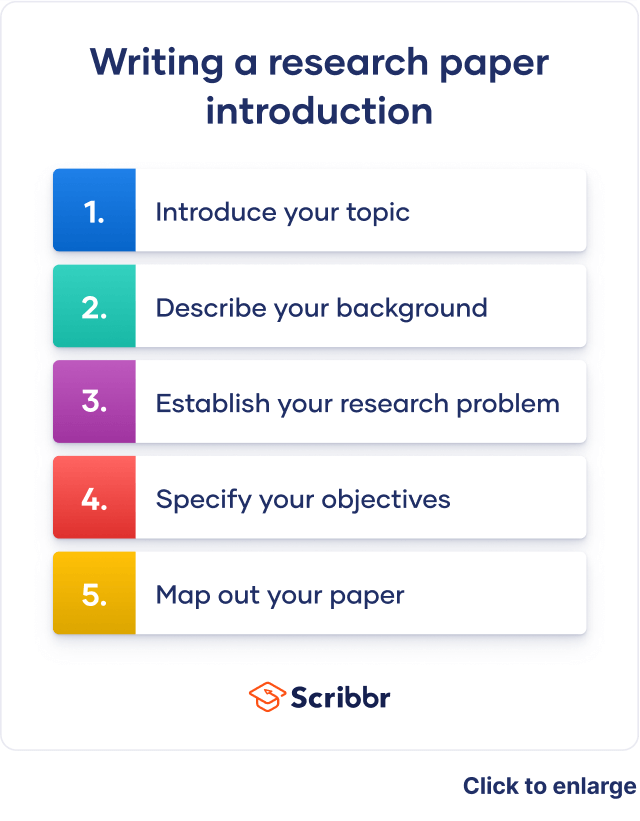
The introduction to a research paper is where you set up your topic and approach for the reader. It has several key goals:
- Present your topic and get the reader interested
- Provide background or summarize existing research
- Position your own approach
- Detail your specific research problem and problem statement
- Give an overview of the paper’s structure
The introduction looks slightly different depending on whether your paper presents the results of original empirical research or constructs an argument by engaging with a variety of sources.
Instantly correct all language mistakes in your text
Upload your document to correct all your mistakes in minutes

Table of contents
Step 1: introduce your topic, step 2: describe the background, step 3: establish your research problem, step 4: specify your objective(s), step 5: map out your paper, research paper introduction examples, frequently asked questions about the research paper introduction.
The first job of the introduction is to tell the reader what your topic is and why it’s interesting or important. This is generally accomplished with a strong opening hook.
The hook is a striking opening sentence that clearly conveys the relevance of your topic. Think of an interesting fact or statistic, a strong statement, a question, or a brief anecdote that will get the reader wondering about your topic.
For example, the following could be an effective hook for an argumentative paper about the environmental impact of cattle farming:
A more empirical paper investigating the relationship of Instagram use with body image issues in adolescent girls might use the following hook:
Don’t feel that your hook necessarily has to be deeply impressive or creative. Clarity and relevance are still more important than catchiness. The key thing is to guide the reader into your topic and situate your ideas.
Scribbr Citation Checker New
The AI-powered Citation Checker helps you avoid common mistakes such as:
- Missing commas and periods
- Incorrect usage of “et al.”
- Ampersands (&) in narrative citations
- Missing reference entries

This part of the introduction differs depending on what approach your paper is taking.
In a more argumentative paper, you’ll explore some general background here. In a more empirical paper, this is the place to review previous research and establish how yours fits in.
Argumentative paper: Background information
After you’ve caught your reader’s attention, specify a bit more, providing context and narrowing down your topic.
Provide only the most relevant background information. The introduction isn’t the place to get too in-depth; if more background is essential to your paper, it can appear in the body .
Empirical paper: Describing previous research
For a paper describing original research, you’ll instead provide an overview of the most relevant research that has already been conducted. This is a sort of miniature literature review —a sketch of the current state of research into your topic, boiled down to a few sentences.
This should be informed by genuine engagement with the literature. Your search can be less extensive than in a full literature review, but a clear sense of the relevant research is crucial to inform your own work.
Begin by establishing the kinds of research that have been done, and end with limitations or gaps in the research that you intend to respond to.
The next step is to clarify how your own research fits in and what problem it addresses.
Argumentative paper: Emphasize importance
In an argumentative research paper, you can simply state the problem you intend to discuss, and what is original or important about your argument.
Empirical paper: Relate to the literature
In an empirical research paper, try to lead into the problem on the basis of your discussion of the literature. Think in terms of these questions:
- What research gap is your work intended to fill?
- What limitations in previous work does it address?
- What contribution to knowledge does it make?
You can make the connection between your problem and the existing research using phrases like the following.
Now you’ll get into the specifics of what you intend to find out or express in your research paper.
The way you frame your research objectives varies. An argumentative paper presents a thesis statement, while an empirical paper generally poses a research question (sometimes with a hypothesis as to the answer).
Argumentative paper: Thesis statement
The thesis statement expresses the position that the rest of the paper will present evidence and arguments for. It can be presented in one or two sentences, and should state your position clearly and directly, without providing specific arguments for it at this point.
Empirical paper: Research question and hypothesis
The research question is the question you want to answer in an empirical research paper.
Present your research question clearly and directly, with a minimum of discussion at this point. The rest of the paper will be taken up with discussing and investigating this question; here you just need to express it.
A research question can be framed either directly or indirectly.
- This study set out to answer the following question: What effects does daily use of Instagram have on the prevalence of body image issues among adolescent girls?
- We investigated the effects of daily Instagram use on the prevalence of body image issues among adolescent girls.
If your research involved testing hypotheses , these should be stated along with your research question. They are usually presented in the past tense, since the hypothesis will already have been tested by the time you are writing up your paper.
For example, the following hypothesis might respond to the research question above:
The final part of the introduction is often dedicated to a brief overview of the rest of the paper.
In a paper structured using the standard scientific “introduction, methods, results, discussion” format, this isn’t always necessary. But if your paper is structured in a less predictable way, it’s important to describe the shape of it for the reader.
If included, the overview should be concise, direct, and written in the present tense.
- This paper will first discuss several examples of survey-based research into adolescent social media use, then will go on to …
- This paper first discusses several examples of survey-based research into adolescent social media use, then goes on to …
Full examples of research paper introductions are shown in the tabs below: one for an argumentative paper, the other for an empirical paper.
- Argumentative paper
- Empirical paper
Are cows responsible for climate change? A recent study (RIVM, 2019) shows that cattle farmers account for two thirds of agricultural nitrogen emissions in the Netherlands. These emissions result from nitrogen in manure, which can degrade into ammonia and enter the atmosphere. The study’s calculations show that agriculture is the main source of nitrogen pollution, accounting for 46% of the country’s total emissions. By comparison, road traffic and households are responsible for 6.1% each, the industrial sector for 1%. While efforts are being made to mitigate these emissions, policymakers are reluctant to reckon with the scale of the problem. The approach presented here is a radical one, but commensurate with the issue. This paper argues that the Dutch government must stimulate and subsidize livestock farmers, especially cattle farmers, to transition to sustainable vegetable farming. It first establishes the inadequacy of current mitigation measures, then discusses the various advantages of the results proposed, and finally addresses potential objections to the plan on economic grounds.
The rise of social media has been accompanied by a sharp increase in the prevalence of body image issues among women and girls. This correlation has received significant academic attention: Various empirical studies have been conducted into Facebook usage among adolescent girls (Tiggermann & Slater, 2013; Meier & Gray, 2014). These studies have consistently found that the visual and interactive aspects of the platform have the greatest influence on body image issues. Despite this, highly visual social media (HVSM) such as Instagram have yet to be robustly researched. This paper sets out to address this research gap. We investigated the effects of daily Instagram use on the prevalence of body image issues among adolescent girls. It was hypothesized that daily Instagram use would be associated with an increase in body image concerns and a decrease in self-esteem ratings.
The introduction of a research paper includes several key elements:
- A hook to catch the reader’s interest
- Relevant background on the topic
- Details of your research problem
and your problem statement
- A thesis statement or research question
- Sometimes an overview of the paper
Don’t feel that you have to write the introduction first. The introduction is often one of the last parts of the research paper you’ll write, along with the conclusion.
This is because it can be easier to introduce your paper once you’ve already written the body ; you may not have the clearest idea of your arguments until you’ve written them, and things can change during the writing process .
The way you present your research problem in your introduction varies depending on the nature of your research paper . A research paper that presents a sustained argument will usually encapsulate this argument in a thesis statement .
A research paper designed to present the results of empirical research tends to present a research question that it seeks to answer. It may also include a hypothesis —a prediction that will be confirmed or disproved by your research.
Cite this Scribbr article
If you want to cite this source, you can copy and paste the citation or click the “Cite this Scribbr article” button to automatically add the citation to our free Citation Generator.
Caulfield, J. (2023, March 27). Writing a Research Paper Introduction | Step-by-Step Guide. Scribbr. Retrieved April 4, 2024, from https://www.scribbr.com/research-paper/research-paper-introduction/
Is this article helpful?

Jack Caulfield
Other students also liked, writing strong research questions | criteria & examples, writing a research paper conclusion | step-by-step guide, research paper format | apa, mla, & chicago templates, unlimited academic ai-proofreading.
✔ Document error-free in 5minutes ✔ Unlimited document corrections ✔ Specialized in correcting academic texts

- Spartanburg Community College Library
- SCC Research Guides
- Choosing a Research Topic
- What Makes a Good Research Topic?
Before diving into how to choose a research topic, it is important to think about what are some elements of a good research topic. Of course, this will depend specifically on your research project, but a good research topic will always:
- Relate to the assignment itself. Even when you have a choice for your research topic, you still want to make sure your chosen topic lines up with your class assignment sheet.
- A topic that is too broad will give you too many sources, and it will be hard to focus your research.
- A topic that is too narrow will not give you enough sources, if you can find any sources at all.
- Is debatable. This is important if you are researching a topic that you will have to argue a position for. Good topics have more than one side to the issue and cannot be resolved with a simple yes or no.
- Should be interesting to you! It's more fun to do research on a topic that you are interested in as opposed to one you are not interested in.
Remember, it is common and normal if your research topic changes as you start brainstorming and doing some background research on your topic.
Start with a General Idea
As an example, let's say you were writing a paper about issues relating to college students
- << Previous: Choosing a Research Topic
- Next: 1. Concept Mapping >>
- 1. Concept Mapping
- 2. Background Research
- 3. Narrow Your Topic / Thesis Statements
Questions? Ask a Librarian

- Last Updated: Jan 17, 2024 9:31 AM
- URL: https://libguides.sccsc.edu/chooseatopic
Giles Campus | 864.592.4764 | Toll Free 866.542.2779 | Contact Us
Copyright © 2024 Spartanburg Community College. All rights reserved.
Info for Library Staff | Guide Search
Return to SCC Website
- PRO Courses Guides New Tech Help Pro Expert Videos About wikiHow Pro Upgrade Sign In
- EDIT Edit this Article
- EXPLORE Tech Help Pro About Us Random Article Quizzes Request a New Article Community Dashboard This Or That Game Popular Categories Arts and Entertainment Artwork Books Movies Computers and Electronics Computers Phone Skills Technology Hacks Health Men's Health Mental Health Women's Health Relationships Dating Love Relationship Issues Hobbies and Crafts Crafts Drawing Games Education & Communication Communication Skills Personal Development Studying Personal Care and Style Fashion Hair Care Personal Hygiene Youth Personal Care School Stuff Dating All Categories Arts and Entertainment Finance and Business Home and Garden Relationship Quizzes Cars & Other Vehicles Food and Entertaining Personal Care and Style Sports and Fitness Computers and Electronics Health Pets and Animals Travel Education & Communication Hobbies and Crafts Philosophy and Religion Work World Family Life Holidays and Traditions Relationships Youth
- Browse Articles
- Learn Something New
- Quizzes Hot
- This Or That Game New
- Train Your Brain
- Explore More
- Support wikiHow
- About wikiHow
- Log in / Sign up
- Education and Communications
How to Research a Topic
Last Updated: January 10, 2024 Fact Checked
This article was co-authored by Christopher Taylor, PhD and by wikiHow staff writer, Jennifer Mueller, JD . Christopher Taylor is an Adjunct Assistant Professor of English at Austin Community College in Texas. He received his PhD in English Literature and Medieval Studies from the University of Texas at Austin in 2014. There are 14 references cited in this article, which can be found at the bottom of the page. This article has been fact-checked, ensuring the accuracy of any cited facts and confirming the authority of its sources. This article has been viewed 291,462 times.
With so much information potentially available at your fingertips, having a research assignment can be daunting. However, if you approach your research methodically, you'll be able to answer any research question in a thoughtful and comprehensive way. Develop a research question that is narrow enough to be addressed within the scope of your paper, then use keywords to find sources that have the information you need. Once you've found several sources, you'll be ready to organize your information into a logical report that adequately answers your question. [1] X Research source
Developing Your Topic

- If you don't understand any aspect of the assignment, don't be afraid to ask your instructor directly. It's better to get an explanation about something than to assume you know what it means and later find out your assumption was incorrect.

- For example, suppose your instructor assigned a research paper about a "public health concern." You might make a list that included such public health concerns as teenage vaping, anti-vaxxers, and drunk driving.
- From your list, choose one area in particular that you want to look at. This is where you'll start your research. For the purposes of this example, assume you chose to research vaping among teenagers.

- If you're doing a general internet search on your topic and not getting back many strong results, there may not be enough information out there for you to research that topic. This is typically rare, though, unless you've started off with a topic that's too narrow. For example, if you want to study vaping in your high school, you might not find enough sources. However, if you expanded your search to include all high schools in your state, you might have more luck.
- If you're not very knowledgeable about your topic, look for a resource that will provide a general overview, so you can become more familiar with possible questions you could answer in your research paper.

- For example, if you wanted to look at teenagers and vaping, you might decide to ask "Are teenagers who vape more likely to smoke than teenagers who don't?"
- How you frame your question also depends on the type of paper you're writing. For example, if you were writing a persuasive research essay, you would need to make a statement, and then back that statement up with research. For example, instead of asking if teenagers who vape are more likely to smoke than teenagers who don't, you might say "Teenagers who vape are more likely to start smoking."
Tip: Be versatile with your research question. Once you start more in-depth research, you may find that you have to adjust it or even change it entirely, and there's nothing wrong with that. It's just part of the process of learning through research.

- Look at the number of results you get, as well as the quality of the sources. You might also try an academic search engine, such as Google Scholar, to see how much academic material is out there on your chosen question.

- For example, if you've selected teenagers who vape, the "who" would be teenagers. If a search of that topic yields too much information, you might scale it back by looking at a specific 5-year period (the "when") or only at teenagers in a specific state (the "where").
- If you needed to broaden your question on the same topic, you may decide to look at teenagers and young adults under the age of 25, not just teenagers.
Finding Quality Sources

- 1- to 2-page paper: 2 to 3 webpages or short journal articles
- 3- to 5-page paper: 4 to 8 journals or scholarly articles, webpages, or books
- 5- to 10-page paper: 6 to 15 journals or scholarly articles, webpages, or books
- 10- to 15-page paper: 12 to 20 journals or scholarly articles, webpages, or books

- For example, if you're researching the prevalence of vaping among teenagers, you might also include "adolescents" and "youth" as synonyms for teenagers, along with "tobacco use" or "e-cigarettes" as synonyms for vaping.
- Take advantage of academic databases available online through your school in addition to the internet.
Tip: Get help from research librarians. They know the most efficient ways to find the information you need and may be able to help you access sources you didn't even know existed.

- Currency : How recent is the information? When was the source last updated?
- Reliability : Are there references for facts and data? Is the content mostly opinion?
- Authority : Who is the creator of the content? Who is the publisher? Are they biased in any way? Does the creator have academic credentials in the field?
- Accuracy : Has the content been peer-reviewed or edited by a third party? Is the information supported by evidence? Can you easily verify facts in another source?
- Purpose/Perspective : Is the content intended to teach you something or to sell you something? Is the information presented biased?
Tip: If your source fails any prong of the CRAAP method, use extreme caution if you refer to it in your research paper. If it fails more than one prong, you're probably better off not using it.

- If an author mentions a particular source more than once, you definitely want to read that material.
- The reference list typically contains enough information for you to find the source on your own. If you find that you can't access the source, for example because it's behind a paywall, talk to your school or a public librarian about it. They may be able to get you access.

- List the citation information for the source at the top of the card, then take notes in your words. Include the page numbers (if applicable) that you would use in your citation.
- If you copy something directly from the source, put quote marks around those words and write the page number (if applicable) where that quote appears. You may also want to distinguish quotes even further, for example, by having quotes in a different color text than your words. This will help protect you against accidental plagiarism .
Organizing Your Information

- Include columns for the full citation and in-text citation for each of your sources. Provide a column for your notes and add them to your spreadsheet. If you have direct quotes, you might include a separate column for those quotes.
- Many word-processing apps have citation features that will allow you to input a new source from a list, so you only have to type the citation once. With a spreadsheet, you can simply cut and paste.
Tip: Even if your word-processing app automatically formats your citation for you, it's good practice to create the citation yourself in your spreadsheet.

- For example, if you were writing a paper on teenagers and vaping, you may have notes related to the age teenagers started vaping, the reasons they started vaping, and their exposure to tobacco or nicotine before they started vaping.
- If you used a digital note-taking app, you typically would categorize your notes by adding tags to them. Some notes may have more than one tag, depending on the information it covered.

- For example, suppose your research indicated that teenagers who vaped were more likely to switch to regular cigarettes if someone in their household smoked. The category covering teenage vapers' exposure to tobacco or nicotine before they started vaping would most likely be the first thing you talked about in your paper, assuming you wanted to put the strongest evidence first.

- Unless your instructor has specific requirements for your outline, you can make it as detailed or as simple as you want. Some people prefer full sentences in their outlines, while others have sections with just a word or two.
- Working through the outline methodically can help you identify information that you don't have yet that you need to support your thesis or answer your research question.

- Even at this late stage, don't be afraid to change your question to more accurately frame your research. Because of your research, you know a lot more about the topic than you did when you first wrote your question, so it's natural that you would see ways to improve it.

- For example, when outlining your paper about teenagers and vaping, you may realize that you don't have any information on how teenagers access e-cigarettes and whether that access is legal or illegal. If you're writing a paper about teenagers vaping as a public health concern, this is information you would need to know.
- It's also likely that as you formulated your outline, you discovered that you didn't need some sources you previously thought would be valuable. In that situation, you may need to seek more sources, especially if throwing out a source took you below the minimum number of sources required for your assignment.
Community Q&A

- Start your research as soon as possible after you get your assignment. If you leave it to the last minute, you won't have time to properly research the topic. You may also find that you overlook important information or make mistakes because you're rushing to finish. Thanks Helpful 4 Not Helpful 0
- Breaking the research process down into small chunks and accomplishing a little each day can help you manage your time. Plan on spending at least as much time researching as you spend writing, if not more. Thanks Helpful 4 Not Helpful 0

You Might Also Like

- ↑ https://libguides.uta.edu/researchprocess/organize
- ↑ https://researchguides.ben.edu/topics
- ↑ https://clark.libguides.com/brainstorming
- ↑ https://libraries.indiana.edu/sites/default/files/Develop_a_Research_Question.pdf
- ↑ https://www.nhcc.edu/student-resources/library/doinglibraryresearch/basic-steps-in-the-research-process
- ↑ https://ggu.libguides.com/c.php?g=106905&p=694002
- ↑ https://salve.libguides.com/c.php?g=434998&p=2963676
- ↑ https://guides.lib.lsu.edu/ENG1001/CRAAP
- ↑ https://libguides.sdstate.edu/c.php?g=842619&p=6053357
- ↑ https://advice.writing.utoronto.ca/researching/notes-from-research/
- ↑ https://academicguides.waldenu.edu/writingcenter/writingprocess/organizing
- ↑ https://libguides.usc.edu/writingguide/outline
- ↑ https://guides.lib.k-state.edu/c.php?g=181829&p=1197416
- ↑ https://guides.lib.k-state.edu/c.php?g=181829&p=1196003
About This Article

To research a topic, you should use scholarly articles, books, and authoritative webpages, since they'll offer the most reliable information. You can find good sources by searching for keywords related to your topic online or using an academic database. For example, if your topic is about saving wild tigers, you could include keywords like "conservation," "tigers," and "wildlife," in your searches. Once you find a source you want to use, double check that it's up to date and written by someone trustworthy before you use it. Additionally, make sure you keep track of all your sources, since you'll need to make a reference list that includes each source you used. For tips on how to come up with a research topic, keep reading! Did this summary help you? Yes No
- Send fan mail to authors
Reader Success Stories
Jenna-lea O.
Nov 20, 2023
Did this article help you?
Nov 6, 2023
Feb 6, 2017
Oct 27, 2019

Featured Articles

Trending Articles

Watch Articles

- Terms of Use
- Privacy Policy
- Do Not Sell or Share My Info
- Not Selling Info
Don’t miss out! Sign up for
wikiHow’s newsletter
Research Topics & Ideas: Education
170+ Research Ideas To Fast-Track Your Project

If you’re just starting out exploring education-related topics for your dissertation, thesis or research project, you’ve come to the right place. In this post, we’ll help kickstart your research topic ideation process by providing a hearty list of research topics and ideas , including examples from actual dissertations and theses..
PS – This is just the start…
We know it’s exciting to run through a list of research topics, but please keep in mind that this list is just a starting point . To develop a suitable education-related research topic, you’ll need to identify a clear and convincing research gap , and a viable plan of action to fill that gap.
If this sounds foreign to you, check out our free research topic webinar that explores how to find and refine a high-quality research topic, from scratch. Alternatively, if you’d like hands-on help, consider our 1-on-1 coaching service .
Overview: Education Research Topics
- How to find a research topic (video)
- List of 50+ education-related research topics/ideas
- List of 120+ level-specific research topics
- Examples of actual dissertation topics in education
- Tips to fast-track your topic ideation (video)
- Free Webinar : Topic Ideation 101
- Where to get extra help
Education-Related Research Topics & Ideas
Below you’ll find a list of education-related research topics and idea kickstarters. These are fairly broad and flexible to various contexts, so keep in mind that you will need to refine them a little. Nevertheless, they should inspire some ideas for your project.
- The impact of school funding on student achievement
- The effects of social and emotional learning on student well-being
- The effects of parental involvement on student behaviour
- The impact of teacher training on student learning
- The impact of classroom design on student learning
- The impact of poverty on education
- The use of student data to inform instruction
- The role of parental involvement in education
- The effects of mindfulness practices in the classroom
- The use of technology in the classroom
- The role of critical thinking in education
- The use of formative and summative assessments in the classroom
- The use of differentiated instruction in the classroom
- The use of gamification in education
- The effects of teacher burnout on student learning
- The impact of school leadership on student achievement
- The effects of teacher diversity on student outcomes
- The role of teacher collaboration in improving student outcomes
- The implementation of blended and online learning
- The effects of teacher accountability on student achievement
- The effects of standardized testing on student learning
- The effects of classroom management on student behaviour
- The effects of school culture on student achievement
- The use of student-centred learning in the classroom
- The impact of teacher-student relationships on student outcomes
- The achievement gap in minority and low-income students
- The use of culturally responsive teaching in the classroom
- The impact of teacher professional development on student learning
- The use of project-based learning in the classroom
- The effects of teacher expectations on student achievement
- The use of adaptive learning technology in the classroom
- The impact of teacher turnover on student learning
- The effects of teacher recruitment and retention on student learning
- The impact of early childhood education on later academic success
- The impact of parental involvement on student engagement
- The use of positive reinforcement in education
- The impact of school climate on student engagement
- The role of STEM education in preparing students for the workforce
- The effects of school choice on student achievement
- The use of technology in the form of online tutoring
Level-Specific Research Topics
Looking for research topics for a specific level of education? We’ve got you covered. Below you can find research topic ideas for primary, secondary and tertiary-level education contexts. Click the relevant level to view the respective list.
Research Topics: Pick An Education Level
Primary education.
- Investigating the effects of peer tutoring on academic achievement in primary school
- Exploring the benefits of mindfulness practices in primary school classrooms
- Examining the effects of different teaching strategies on primary school students’ problem-solving skills
- The use of storytelling as a teaching strategy in primary school literacy instruction
- The role of cultural diversity in promoting tolerance and understanding in primary schools
- The impact of character education programs on moral development in primary school students
- Investigating the use of technology in enhancing primary school mathematics education
- The impact of inclusive curriculum on promoting equity and diversity in primary schools
- The impact of outdoor education programs on environmental awareness in primary school students
- The influence of school climate on student motivation and engagement in primary schools
- Investigating the effects of early literacy interventions on reading comprehension in primary school students
- The impact of parental involvement in school decision-making processes on student achievement in primary schools
- Exploring the benefits of inclusive education for students with special needs in primary schools
- Investigating the effects of teacher-student feedback on academic motivation in primary schools
- The role of technology in developing digital literacy skills in primary school students
- Effective strategies for fostering a growth mindset in primary school students
- Investigating the role of parental support in reducing academic stress in primary school children
- The role of arts education in fostering creativity and self-expression in primary school students
- Examining the effects of early childhood education programs on primary school readiness
- Examining the effects of homework on primary school students’ academic performance
- The role of formative assessment in improving learning outcomes in primary school classrooms
- The impact of teacher-student relationships on academic outcomes in primary school
- Investigating the effects of classroom environment on student behavior and learning outcomes in primary schools
- Investigating the role of creativity and imagination in primary school curriculum
- The impact of nutrition and healthy eating programs on academic performance in primary schools
- The impact of social-emotional learning programs on primary school students’ well-being and academic performance
- The role of parental involvement in academic achievement of primary school children
- Examining the effects of classroom management strategies on student behavior in primary school
- The role of school leadership in creating a positive school climate Exploring the benefits of bilingual education in primary schools
- The effectiveness of project-based learning in developing critical thinking skills in primary school students
- The role of inquiry-based learning in fostering curiosity and critical thinking in primary school students
- The effects of class size on student engagement and achievement in primary schools
- Investigating the effects of recess and physical activity breaks on attention and learning in primary school
- Exploring the benefits of outdoor play in developing gross motor skills in primary school children
- The effects of educational field trips on knowledge retention in primary school students
- Examining the effects of inclusive classroom practices on students’ attitudes towards diversity in primary schools
- The impact of parental involvement in homework on primary school students’ academic achievement
- Investigating the effectiveness of different assessment methods in primary school classrooms
- The influence of physical activity and exercise on cognitive development in primary school children
- Exploring the benefits of cooperative learning in promoting social skills in primary school students
Secondary Education
- Investigating the effects of school discipline policies on student behavior and academic success in secondary education
- The role of social media in enhancing communication and collaboration among secondary school students
- The impact of school leadership on teacher effectiveness and student outcomes in secondary schools
- Investigating the effects of technology integration on teaching and learning in secondary education
- Exploring the benefits of interdisciplinary instruction in promoting critical thinking skills in secondary schools
- The impact of arts education on creativity and self-expression in secondary school students
- The effectiveness of flipped classrooms in promoting student learning in secondary education
- The role of career guidance programs in preparing secondary school students for future employment
- Investigating the effects of student-centered learning approaches on student autonomy and academic success in secondary schools
- The impact of socio-economic factors on educational attainment in secondary education
- Investigating the impact of project-based learning on student engagement and academic achievement in secondary schools
- Investigating the effects of multicultural education on cultural understanding and tolerance in secondary schools
- The influence of standardized testing on teaching practices and student learning in secondary education
- Investigating the effects of classroom management strategies on student behavior and academic engagement in secondary education
- The influence of teacher professional development on instructional practices and student outcomes in secondary schools
- The role of extracurricular activities in promoting holistic development and well-roundedness in secondary school students
- Investigating the effects of blended learning models on student engagement and achievement in secondary education
- The role of physical education in promoting physical health and well-being among secondary school students
- Investigating the effects of gender on academic achievement and career aspirations in secondary education
- Exploring the benefits of multicultural literature in promoting cultural awareness and empathy among secondary school students
- The impact of school counseling services on student mental health and well-being in secondary schools
- Exploring the benefits of vocational education and training in preparing secondary school students for the workforce
- The role of digital literacy in preparing secondary school students for the digital age
- The influence of parental involvement on academic success and well-being of secondary school students
- The impact of social-emotional learning programs on secondary school students’ well-being and academic success
- The role of character education in fostering ethical and responsible behavior in secondary school students
- Examining the effects of digital citizenship education on responsible and ethical technology use among secondary school students
- The impact of parental involvement in school decision-making processes on student outcomes in secondary schools
- The role of educational technology in promoting personalized learning experiences in secondary schools
- The impact of inclusive education on the social and academic outcomes of students with disabilities in secondary schools
- The influence of parental support on academic motivation and achievement in secondary education
- The role of school climate in promoting positive behavior and well-being among secondary school students
- Examining the effects of peer mentoring programs on academic achievement and social-emotional development in secondary schools
- Examining the effects of teacher-student relationships on student motivation and achievement in secondary schools
- Exploring the benefits of service-learning programs in promoting civic engagement among secondary school students
- The impact of educational policies on educational equity and access in secondary education
- Examining the effects of homework on academic achievement and student well-being in secondary education
- Investigating the effects of different assessment methods on student performance in secondary schools
- Examining the effects of single-sex education on academic performance and gender stereotypes in secondary schools
- The role of mentoring programs in supporting the transition from secondary to post-secondary education
Tertiary Education
- The role of student support services in promoting academic success and well-being in higher education
- The impact of internationalization initiatives on students’ intercultural competence and global perspectives in tertiary education
- Investigating the effects of active learning classrooms and learning spaces on student engagement and learning outcomes in tertiary education
- Exploring the benefits of service-learning experiences in fostering civic engagement and social responsibility in higher education
- The influence of learning communities and collaborative learning environments on student academic and social integration in higher education
- Exploring the benefits of undergraduate research experiences in fostering critical thinking and scientific inquiry skills
- Investigating the effects of academic advising and mentoring on student retention and degree completion in higher education
- The role of student engagement and involvement in co-curricular activities on holistic student development in higher education
- The impact of multicultural education on fostering cultural competence and diversity appreciation in higher education
- The role of internships and work-integrated learning experiences in enhancing students’ employability and career outcomes
- Examining the effects of assessment and feedback practices on student learning and academic achievement in tertiary education
- The influence of faculty professional development on instructional practices and student outcomes in tertiary education
- The influence of faculty-student relationships on student success and well-being in tertiary education
- The impact of college transition programs on students’ academic and social adjustment to higher education
- The impact of online learning platforms on student learning outcomes in higher education
- The impact of financial aid and scholarships on access and persistence in higher education
- The influence of student leadership and involvement in extracurricular activities on personal development and campus engagement
- Exploring the benefits of competency-based education in developing job-specific skills in tertiary students
- Examining the effects of flipped classroom models on student learning and retention in higher education
- Exploring the benefits of online collaboration and virtual team projects in developing teamwork skills in tertiary students
- Investigating the effects of diversity and inclusion initiatives on campus climate and student experiences in tertiary education
- The influence of study abroad programs on intercultural competence and global perspectives of college students
- Investigating the effects of peer mentoring and tutoring programs on student retention and academic performance in tertiary education
- Investigating the effectiveness of active learning strategies in promoting student engagement and achievement in tertiary education
- Investigating the effects of blended learning models and hybrid courses on student learning and satisfaction in higher education
- The role of digital literacy and information literacy skills in supporting student success in the digital age
- Investigating the effects of experiential learning opportunities on career readiness and employability of college students
- The impact of e-portfolios on student reflection, self-assessment, and showcasing of learning in higher education
- The role of technology in enhancing collaborative learning experiences in tertiary classrooms
- The impact of research opportunities on undergraduate student engagement and pursuit of advanced degrees
- Examining the effects of competency-based assessment on measuring student learning and achievement in tertiary education
- Examining the effects of interdisciplinary programs and courses on critical thinking and problem-solving skills in college students
- The role of inclusive education and accessibility in promoting equitable learning experiences for diverse student populations
- The role of career counseling and guidance in supporting students’ career decision-making in tertiary education
- The influence of faculty diversity and representation on student success and inclusive learning environments in higher education

Education-Related Dissertations & Theses
While the ideas we’ve presented above are a decent starting point for finding a research topic in education, they are fairly generic and non-specific. So, it helps to look at actual dissertations and theses in the education space to see how this all comes together in practice.
Below, we’ve included a selection of education-related research projects to help refine your thinking. These are actual dissertations and theses, written as part of Master’s and PhD-level programs, so they can provide some useful insight as to what a research topic looks like in practice.
- From Rural to Urban: Education Conditions of Migrant Children in China (Wang, 2019)
- Energy Renovation While Learning English: A Guidebook for Elementary ESL Teachers (Yang, 2019)
- A Reanalyses of Intercorrelational Matrices of Visual and Verbal Learners’ Abilities, Cognitive Styles, and Learning Preferences (Fox, 2020)
- A study of the elementary math program utilized by a mid-Missouri school district (Barabas, 2020)
- Instructor formative assessment practices in virtual learning environments : a posthumanist sociomaterial perspective (Burcks, 2019)
- Higher education students services: a qualitative study of two mid-size universities’ direct exchange programs (Kinde, 2020)
- Exploring editorial leadership : a qualitative study of scholastic journalism advisers teaching leadership in Missouri secondary schools (Lewis, 2020)
- Selling the virtual university: a multimodal discourse analysis of marketing for online learning (Ludwig, 2020)
- Advocacy and accountability in school counselling: assessing the use of data as related to professional self-efficacy (Matthews, 2020)
- The use of an application screening assessment as a predictor of teaching retention at a midwestern, K-12, public school district (Scarbrough, 2020)
- Core values driving sustained elite performance cultures (Beiner, 2020)
- Educative features of upper elementary Eureka math curriculum (Dwiggins, 2020)
- How female principals nurture adult learning opportunities in successful high schools with challenging student demographics (Woodward, 2020)
- The disproportionality of Black Males in Special Education: A Case Study Analysis of Educator Perceptions in a Southeastern Urban High School (McCrae, 2021)
As you can see, these research topics are a lot more focused than the generic topic ideas we presented earlier. So, in order for you to develop a high-quality research topic, you’ll need to get specific and laser-focused on a specific context with specific variables of interest. In the video below, we explore some other important things you’ll need to consider when crafting your research topic.
Get 1-On-1 Help
If you’re still unsure about how to find a quality research topic within education, check out our Research Topic Kickstarter service, which is the perfect starting point for developing a unique, well-justified research topic.

You Might Also Like:

54 Comments
This is an helpful tool 🙏
Special education
Really appreciated by this . It is the best platform for research related items
Research title related to school of students
Research title related to students
Good idea I’m going to teach my colleagues
You can find our list of nursing-related research topic ideas here: https://gradcoach.com/research-topics-nursing/
Write on action research topic, using guidance and counseling to address unwanted teenage pregnancy in school
Thanks a lot
I learned a lot from this site, thank you so much!
Thank you for the information.. I would like to request a topic based on school major in social studies
parental involvement and students academic performance
Science education topics?
How about School management and supervision pls.?
Hi i am an Deputy Principal in a primary school. My wish is to srudy foe Master’s degree in Education.Please advice me on which topic can be relevant for me. Thanks.
Every topic proposed above on primary education is a starting point for me. I appreciate immensely the team that has sat down to make a detail of these selected topics just for beginners like us. Be blessed.
Kindly help me with the research questions on the topic” Effects of workplace conflict on the employees’ job performance”. The effects can be applicable in every institution,enterprise or organisation.
Greetings, I am a student majoring in Sociology and minoring in Public Administration. I’m considering any recommended research topic in the field of Sociology.
I’m a student pursuing Mphil in Basic education and I’m considering any recommended research proposal topic in my field of study
Kindly help me with a research topic in educational psychology. Ph.D level. Thank you.
Project-based learning is a teaching/learning type,if well applied in a classroom setting will yield serious positive impact. What can a teacher do to implement this in a disadvantaged zone like “North West Region of Cameroon ( hinterland) where war has brought about prolonged and untold sufferings on the indegins?
I wish to get help on topics of research on educational administration
I wish to get help on topics of research on educational administration PhD level
I am also looking for such type of title
I am a student of undergraduate, doing research on how to use guidance and counseling to address unwanted teenage pregnancy in school
the topics are very good regarding research & education .
Can i request your suggestion topic for my Thesis about Teachers as an OFW. thanx you
Would like to request for suggestions on a topic in Economics of education,PhD level
Would like to request for suggestions on a topic in Economics of education
Hi 👋 I request that you help me with a written research proposal about education the format
l would like to request suggestions on a topic in managing teaching and learning, PhD level (educational leadership and management)
request suggestions on a topic in managing teaching and learning, PhD level (educational leadership and management)
I would to inquire on research topics on Educational psychology, Masters degree
I am PhD student, I am searching my Research topic, It should be innovative,my area of interest is online education,use of technology in education
request suggestion on topic in masters in medical education .
Look at British Library as they keep a copy of all PhDs in the UK Core.ac.uk to access Open University and 6 other university e-archives, pdf downloads mostly available, all free.
May I also ask for a topic based on mathematics education for college teaching, please?
Please I am a masters student of the department of Teacher Education, Faculty of Education Please I am in need of proposed project topics to help with my final year thesis
Am a PhD student in Educational Foundations would like a sociological topic. Thank
please i need a proposed thesis project regardging computer science
Greetings and Regards I am a doctoral student in the field of philosophy of education. I am looking for a new topic for my thesis. Because of my work in the elementary school, I am looking for a topic that is from the field of elementary education and is related to the philosophy of education.
Masters student in the field of curriculum, any ideas of a research topic on low achiever students
In the field of curriculum any ideas of a research topic on deconalization in contextualization of digital teaching and learning through in higher education
Amazing guidelines
I am a graduate with two masters. 1) Master of arts in religious studies and 2) Master in education in foundations of education. I intend to do a Ph.D. on my second master’s, however, I need to bring both masters together through my Ph.D. research. can I do something like, ” The contribution of Philosophy of education for a quality religion education in Kenya”? kindly, assist and be free to suggest a similar topic that will bring together the two masters. thanks in advance
Hi, I am an Early childhood trainer as well as a researcher, I need more support on this topic: The impact of early childhood education on later academic success.
Submit a Comment Cancel reply
Your email address will not be published. Required fields are marked *
Save my name, email, and website in this browser for the next time I comment.
- Print Friendly
Featured Topics
Featured series.
A series of random questions answered by Harvard experts.
Explore the Gazette
Read the latest.

Herbert Chanoch Kelman, 94
Everett irwin mendelsohn, 91.

Anticipate, accommodate, empower
Exploring generative ai at harvard.
Jessica McCann
Harvard Correspondent

Leaders weigh in on where we are and what’s next
The explosion of generative AI technology over the past year and a half is raising big questions about how these tools will impact higher education. Across Harvard, members of the community have been exploring how GenAI will change the ways we teach, learn, research, and work.
As part of this effort, the Office of the Provost has convened three working groups . They will discuss questions, share innovations, and evolve guidance and community resources. They are:
- The Teaching and Learning Group , chaired by Bharat Anand , vice provost for advances in learning and the Henry R. Byers Professor of Business Administration at Harvard Business School. This group seeks to share resources, identify emerging best practices, guide policies, and support the development of tools to address common challenges among faculty and students.
- The Research and Scholarship Group , chaired by John Shaw , vice provost for research, Harry C. Dudley Professor of Structural and Economic Geology in the Earth and Planetary Sciences Department, and professor of environmental science and engineering in the Paulson School of Engineering and Applied Science. It focuses on how to enable, and support the integrity of, scholarly activities with generative AI tools.
- T he Administration and Operations Group , chaired by Klara Jelinkova , vice president and University chief information officer. It is charged with addressing information security, data privacy, procurement, and administration and organizational efficiencies.

Klara Jelinkova, Bharat Anand, and John Shaw.
Photos by Kris Snibbe/Harvard Staff Photographer; Evgenia Eliseeva; and courtesy of John Shaw
The Gazette spoke with Anand, Shaw, and Jelinkova to understand more about the work of these groups and what’s next in generative AI at Harvard.
When generative AI tools first emerged, we saw universities respond in a variety of ways — from encouraging experimentation to prohibiting their use. What was Harvard’s overall approach?
Shaw: From the outset, Harvard has embraced the prospective benefits that GenAI offers to teaching, research, and administration across the University, while being mindful of the potential pitfalls. As a University, our mission is to help enable discovery and innovation, so we had a mandate to actively engage. We set some initial, broad policies that helped guide us, and have worked directly with groups across the institution to provide tools and resources to inspire exploration.
Jelinkova: The rapid emergence of these tools meant the University needed to react quickly, to provide both tools for innovation and experimentation and guidelines to ensure their responsible use. We rapidly built an AI Sandbox to enable faculty, students, and staff to experiment with multiple large language models in a secure environment. We also worked with external vendors to acquire enterprise licenses for a variety of tools to meet many different use cases. Through working groups, we were able to learn, aggregate and collate use cases for AI in teaching, learning, administration, and research. This coordinated, collective, and strategic approach has put Harvard ahead of many peers in higher education.
Anand: Teaching and learning are fundamentally decentralized activities. So our approach was to ask: First, how can we ensure that local experimentation by faculty and staff is enabled as much as possible; and second, how can we ensure that it’s consistent with University policies on IP, copyright, and security? We also wanted to ensure that novel emerging practices were shared across Schools, rather than remaining siloed.
What do these tools mean for faculty, in terms of the challenges they pose or the opportunities they offer? Is there anything you’re particularly excited about?
Anand: Let’s start with some salient challenges. How do we first sift through the hype that’s accompanied GenAI? How can we make it easy for faculty to use GenAI tools in their classrooms without overburdening them with yet another technology? How can one address real concerns about GenAI’s impact?
While we’re still early in this journey, many compelling opportunities — and more importantly, some systematic ways of thinking about them — are emerging. Various Harvard faculty have leaned into experimenting with LLMs in their classrooms. Our team has now interviewed over 30 colleagues across Harvard and curated short videos that capture their learnings. I encourage everyone to view these materials on the new GenAI site; they are remarkable in their depth and breadth of insight.
Here’s a sample: While LLMs are commonly used for Q&A, our faculty have creatively used them for a broader variety of tasks, such as simulating tutors that guide learning by asking questions, simulating instructional designers to provide active learning tips, and simulating student voices to predict how a class discussion might flow, thus aiding in lesson preparation. Others demonstrate how more sophisticated prompts or “prompt engineering” are often necessary to yield more sophisticated LLM responses, and how LLMs can extend well beyond text-based responses to visuals, simulations, coding, and games. And several faculty show how LLMs can help overcome subtle yet important learning frictions like skill gaps in coding, language literacy, or math.
Do these tools offer students an opportunity to support or expand upon their learning?
Anand: Yes. GenAI represents a unique area of innovation where students and faculty are working together. Many colleagues are incorporating student feedback into the GenAI portions of their curriculum or making their own GenAI tools available to students. Since GenAI is new, the pedagogical path is not yet well defined; students have an opportunity to make their voices heard, as co-creators, on what they think the future of their learning should look like.
Beyond this, we’re starting to see other learning benefits. Importantly, GenAI can reach beyond a lecture hall. Thoughtful prompt engineering can turn even publicly available GenAI tools into tutorbots that generate interactive practice problems, act as expert conversational aids for material review, or increase TA teams’ capacity. That means both that the classroom is expanding and that more of it is in students’ hands. There’s also evidence that these bots field more questions than teaching teams can normally address and can be more comfortable and accessible for some students.
Of course, we need to identify and counter harmful patterns. There is a risk, in this early and enthusiastic period, of sparking over-reliance on GenAI. Students must critically evaluate how and where they use it, given its possibility of inaccurate or inappropriate responses, and should heed the areas where their style of cognition outperforms AI. One other thing to watch out for is user divide: Some students will graduate with vastly better prompt engineering skills than others, an inequality that will only magnify in the workforce.
What are the main questions your group has been tackling?
Anand: Our group divided its work into three subgroups focused on policy, tools, and resources. We’ve helped guide initial policies to ensure safe and responsible use; begun curating resources for faculty in a One Harvard repository ; and are exploring which tools the University should invest in or develop to ensure that educators and researchers can continue to advance their work.
In the fall, we focused on supporting and guiding HUIT’s development of the AI Sandbox. The Harvard Initiative for Learning and Teaching’s annual conference , which focused exclusively on GenAI, had its highest participation in 10 years. Recently, we’ve been working with the research group to inform the development of tools that promise broad, generalizable use for faculty (e.g., tutorbots).
What has your group focused on in discussions so far about generative AI tools’ use in research?
Shaw: Our group has some incredible strength in researchers who are at the cutting edge of GenAI development and applications, but also includes voices that help us understand the real barriers to faculty and students starting to use these tools in their own research and scholarship. Working with the other teams, we have focused on supporting development and use of the GenAI sandbox, examining IP and security issues, and learning from different groups across campus how they are using these tools to innovate.
Are there key areas of focus for your group in the coming months?
Shaw: We are focused on establishing programs — such as the new GenAI Milton Fund track — to help support innovation in the application of these tools across the wide range of scholarship on our campus. We are also working with the College to develop new programs to help support students who wish to engage with faculty on GenAI-enabled projects. We aim to find ways to convene students and scholars to share their experiences and build a stronger community of practitioners across campus.
What types of administration and operations questions are your group is exploring, and what type of opportunities do you see in this space?
Jelinkova: By using the group to share learnings from across Schools and units, we can better provide technologies to meet the community’s needs while ensuring the most responsible and sustainable use of the University’s financial resources. The connections within this group also inform the guidelines that we provide; by learning how generative AI is being used in different contexts, we can develop best practices and stay alert to emerging risks. There are new tools becoming available almost every day, and many exciting experiments and pilots happening across Harvard, so it’s important to regularly review and update the guidance we provide to our community.
Can you talk a bit about what has come out of these discussions, or other exciting things to come?
Jelinkova: Because this technology is rapidly evolving, we are continually tracking the release of new tools and working with our vendors as well as open-source efforts to ensure we are best supporting the University’s needs. We’re developing more guidance and hosting information sessions on helping people to understand the AI landscape and how to choose the right tool for their task. Beyond tools, we’re also working to build connections across Harvard to support collaboration, including a recently launched AI community of practice . We are capturing valuable findings from emerging technology pilot programs in HUIT , the EVP area , and across Schools. And we are now thinking about how those findings can inform guiding principles and best practices to better support staff.
While the GenAI groups are investigating these questions, Harvard faculty and scholars are also on the forefront of research in this space. Can you talk a bit about some of the interesting research happening across the University in AI more broadly ?
Shaw: Harvard has made deep investments in the development and application of AI across our campus, in our Schools, initiatives, and institutes — such as the Kempner Institute and Harvard Data Science Initiative. In addition, there is a critical role for us to play in examining and guiding the ethics of AI applications — and our strengths in the Safra and Berkman Klein centers, as examples, can be leading voices in this area.
What would be your advice for members of our community who are interested in learning more about generative AI tools?
Anand: I’d encourage our community to view the resources available on the new Generative AI @ Harvard website , to better understand how GenAI tools might benefit you.
There’s also no substitute for experimentation with these tools to learn what works, what does not, and how to tailor them for maximal benefit for your particular needs. And of course, please know and respect University policies around copyright and security.
We’re in the early stages of this journey at Harvard, but it’s exciting.
Share this article
You might like.
Memorial Minute — Faculty of Arts and Sciences

How to ensure students with disabilities have an equal chance to succeed?
College accepts 1,937 to Class of 2028
Students represent 94 countries, all 50 states
Pushing back on DEI ‘orthodoxy’
Panelists support diversity efforts but worry that current model is too narrow, denying institutions the benefit of other voices, ideas
So what exactly makes Taylor Swift so great?
Experts weigh in on pop superstar's cultural and financial impact as her tours and albums continue to break records.
Suggestions or feedback?
MIT News | Massachusetts Institute of Technology
- Machine learning
- Social justice
- Black holes
- Classes and programs
Departments
- Aeronautics and Astronautics
- Brain and Cognitive Sciences
- Architecture
- Political Science
- Mechanical Engineering
Centers, Labs, & Programs
- Abdul Latif Jameel Poverty Action Lab (J-PAL)
- Picower Institute for Learning and Memory
- Lincoln Laboratory
- School of Architecture + Planning
- School of Engineering
- School of Humanities, Arts, and Social Sciences
- Sloan School of Management
- School of Science
- MIT Schwarzman College of Computing
MIT economics to launch new predoctoral fellowship program
Press contact :.
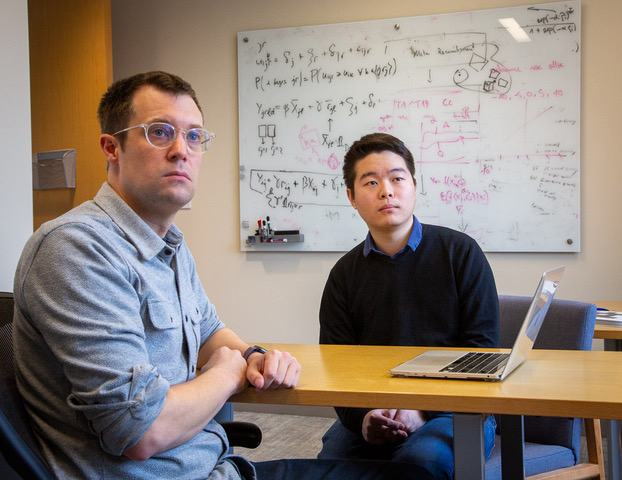
Previous image Next image
The MIT Department of Economics is launching a new program this year that will pair faculty with predoctoral fellows.
“MIT economics right now is historically strong,” says Jon Gruber, the Ford Professor of Economics and department head of MIT economics. “To remain in that position involves having the resources to stay on the cutting edge of the research frontier, and that requires the use of predocs.”
The nature of economic research has changed enormously, adds Gruber, due to factors like the use of large datasets, innovations in experiment design, and comprehensive data analysis, all of which require the support of predocs. This new research model empowers economists to address national and global challenges in profound and much more effective ways.
The new predoc program is made possible by an ongoing major fundraising initiative in the department.
Gruber gave credit to Glenn Ellison, the Gregory K. Palm (1970) Professor of Economics and former department chair, for working closely with Roger Altman, MIT Corporation member and the former head and current member of the visiting committee, to craft a vision for the future of the department that will ultimately include up to 24 predocs that would work for economics faculty at MIT.
“It’s a great vision. They put a lot of work into it,” Gruber says.
With significant support from the Altman Family Fund, Gruber explains, the predoc program will be able to ramp up, providing predocs to the department’s junior faculty. He expects six predocs to start in the department this fall.
“We’ll have a wide range of junior faculty who will be using these predocs for a bunch of really interesting and important questions that are very data- and research-intensive,” Gruber says.
Tobias Salz, the Castle Krob Career Development Associate Professor of Economics, is one of the faculty members already benefiting from a pilot of the new program. He’s working on a large project on the search engine market.
“I am working with a predoctoral research fellow who has been instrumental in many parts of the project, including the design of an experiment and data analysis,” says Salz. “Initially, I was only able to hire him for one year, but with the new funding I am able to extend his contract. The predoctoral program has therefore helped ensure continuity on this project, which has made a big difference.”
Nina Roussille, assistant professor of economics, says her work will greatly benefit from collaborating with a predoc. Several of her projects either require the analysis of large, administrative datasets or the implementation of large-scale experiments.
“This kind of work will be greatly enhanced and streamlined with the help of a predoc to construct, clean, and analyze the data, as well as to set up the experiments and study their effects. This will free up some of my time to participate in more projects and allow me to focus my efforts on high-yield tasks, such as data analysis and paper writing,” says Roussille.
Roussille adds that she’s excited about the opportunity to mentor a young economist on the path to a PhD.
“They’ll greatly benefit from the vibrant research environment of the MIT economics department,” she said.
Gruber sees the program as mutually beneficial for both the predocs and the faculty.
“The advantage for the predoc is they get research experience and they get to know a faculty member,” adds Gruber. “The advantage for the faculty is they get to work with someone who wants to excel and make an impression with the person they research for.”
Beyond establishing the predoc program, this current fundraising initiative prioritizes building resources for faculty research in the Department of Economics. In addition to the gift from the Altman Family Fund to establish the predoctoral fellowship program, this fundraising initiative has secured several other significant contributions, including:
- the creation of the Daniel (1972) and Gail Rubinfeld Professorship Fund, through the support of Dan Rubinfeld, PhD ’72;
- the Thapanee Sirivadhanabhakdi Techajareonvikul (1999) Professorship Fund, established by economics undergraduate alumna and her husband, Aswin Techajareonvkul MBA ’02;
- another endowed professorship in the department, through the support of an anonymous donor;
- the creation of the Locher Economics Fund, which will provide discretionary resources to support faculty research for the department, through the support of Kurt ’88, SM ’89, and Anne Stark Locher; and
- a gift to create the Dr. James A. Berkovec (1977) Memorial Faculty Research Fund in Economics, established by Ben Golub, ’78, SM ’82, PhD ’84.
To date, almost $30 million has been secured for these purposes, and efforts are ongoing.
Share this news article on:
Related links.
- Department of Economics
Related Topics
- Awards, honors and fellowships
- MIT Corporation
- School of Humanities Arts and Social Sciences
Related Articles

MIT scholars awarded seed grants to probe the social implications of generative AI

QS ranks MIT the world’s No. 1 university for 2023-24

Nine from MIT named 2023 Sloan Research Fellows
Previous item Next item
More MIT News
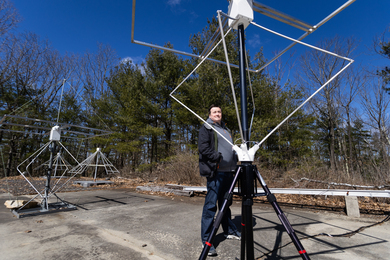
MIT Haystack scientists prepare a constellation of instruments to observe the solar eclipse’s effects
Read full story →

Q&A: Tips for viewing the 2024 solar eclipse

Drinking from a firehose — on stage

Researchers 3D print key components for a point-of-care mass spectrometer

Unlocking new science with devices that control electric power

MIT researchers discover “neutronic molecules”
- More news on MIT News homepage →
Massachusetts Institute of Technology 77 Massachusetts Avenue, Cambridge, MA, USA
- Map (opens in new window)
- Events (opens in new window)
- People (opens in new window)
- Careers (opens in new window)
- Accessibility
- Social Media Hub
- MIT on Facebook
- MIT on YouTube
- MIT on Instagram
Internet Explorer lacks support for the features of this website. For the best experience, please use a modern browser such as Chrome, Firefox, or Edge.

New Research Reveals Full Diversity of Killer Whales as Two Species Come into View on Pacific Coast
March 27, 2024
Long viewed as one worldwide species, killer whale diversity now merits more. Southern Resident Connections - Post 35
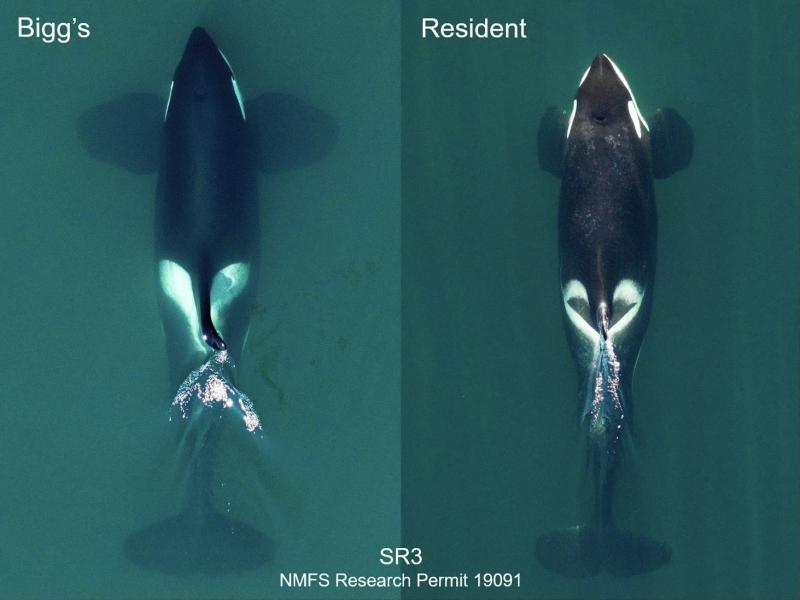
Scientists have resolved one of the outstanding questions about one of the world’s most recognizable creatures, identifying two well-known killer whales in the North Pacific Ocean as separate species.
Killer whales are one of the most widespread animals on Earth. They have long been considered one worldwide species known scientifically as Orcinus orca , with different forms in various regions known as “ecotypes.”
However, biologists have increasingly recognized the differences between resident and Bigg’s killer whales. Resident killer whales maintain tight-knit family pods and prey on salmon and other marine fish. Bigg’s killer whales roam in smaller groups, preying on other marine mammals such as seals and whales. (Killer whales actually belong to the dolphin family.) Bigg’s killer whales, sometimes called transients, are named for Canadian scientist Michael Bigg, the first to describe telltale differences between the two types.
He noted in the 1970s that the two animals did not mix with each other even when they occupied many of the same coastal waters. This is often a sign of different species.
The finding recognizes the accuracy of the listing of Southern Resident killer whales as a Distinct Population Segment warranting protection under the Endangered Species Act in 2005. At the time, NOAA described the distinct population segment as part of an unnamed subspecies of resident killer whales in the North Pacific.
Now a team of scientists from NOAA Fisheries and universities have assembled genetic, physical, and behavioral evidence. The data distinguish two of the killer whale ecotypes of the North Pacific Coast—residents and Bigg’s—as separate species.
“We started to ask this question 20 years ago, but we didn’t have much data, and we did not have the tools that we do now,” said Phil Morin, an evolutionary geneticist at NOAA Fisheries’ Southwest Fisheries Science Center and lead author of the new paper . “Now we have more of both, and the weight of the evidence says these are different species.”
Genetic data from previous studies revealed that the two species likely diverged more than 300,000 years ago and come from opposite ends of the killer whale family tree. That makes them about as genetically different as any killer whale ecotypes around the globe. Subsequent studies of genomic data confirm that they have evolved as genetically and culturally distinct groups, which occupy different niches in the same Northwest marine ecosystem.
“They’re the most different killer whales in the world, and they live right next to each other and see each other all the time,” said Barbara Taylor, a former NOAA Fisheries marine mammal biologist who was part of the science panel that assessed the status of Southern Residents. “They just do not mix.”
Recognizing New Species

The Taxonomy Committee of the Society of Marine Mammalogy will determine whether to recognize the new species in its official list of marine mammal species . The committee will likely determine whether to accept the new designations at its next annual review this summer.
The scientists proposed scientific names for the new species based on their earliest published descriptions in the 1800s. Neither will keep the ubiquitous worldwide moniker, orca . The team proposed to call resident killer whales Orcinus ater , a Latin reference to their dominant black coloring. Bigg’s killer whales would be called Orcinus rectipinnus , a combination of Latin words for erect wing, probably referring to their tall, sharp dorsal fin.
Both species names were originally published in 1869 by Edward Drinker Cope, a Pennsylvania scientist known more for unearthing dinosaurs than studying marine mammals. He was working from a manuscript that California whaling captain Charles Melville Scammon had sent to the Smithsonian Institution describing West Coast marine mammals, including the two killer whales. While Cope credited Scammon for the descriptions, Scammon took issue with Cope for editing and publishing Scammon’s work without telling him. (See accompanying story .)
The Smithsonian Institution had shared Scammon’s work with Cope, and a Smithsonian official later apologized to Scammon for what he called “Cope’s absurd blunder.”
Species Reflect Ecosystem
The contested question of whether Southern Residents were distinct enough to merit endangered species protections initially drove much of the research that helped differentiate the two species, said Eric Archer, who leads the Marine Mammal Genetics Program at the Southwest Fisheries Science Center and is a coauthor of the new research paper. The increasing processing power of computers has made it possible to examine killer whale DNA in ever finer detail. He said the findings not only validate protection for the animals themselves, but also help reveal different components of the marine ecosystems the whales depend on.
“As we better understand what makes these species special, we learn more about how they use the ecosystems they inhabit and what makes those environments special, too,” he said.
The new research synthesizes the earliest accounts of killer whales on the Pacific Coast with modern data on physical characteristics.
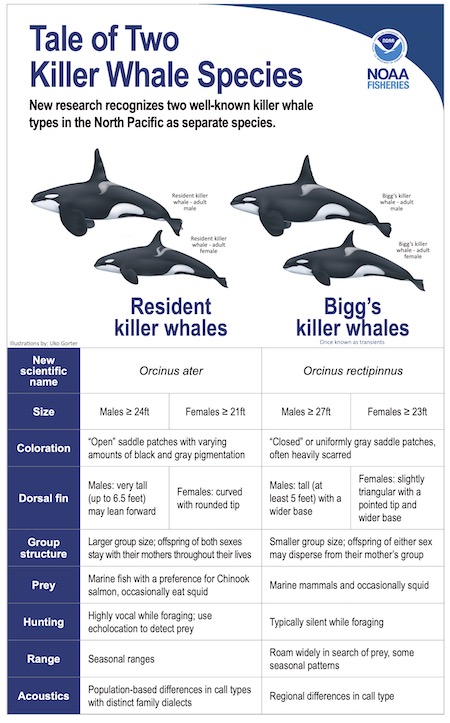
The team also use aerial imaging (called photogrammetry ), and measurement and genetic testing of museum specimens at the Smithsonian and elsewhere. While the two species look similar to the untrained eye, the evidence demonstrates they are very different species. The two species use different ecological niches, such as specializing in different prey, said Kim Parsons, a geneticist at the NOAA Fisheries Northwest Fisheries Science Center in Seattle and coauthor of the new research.
Recent research with drones that collect precise aerial photos has helped differentiate Bigg’s killer whales as longer and larger. This might better equip them to go after large marine mammal prey. The smaller size of residents is likely better suited to deep dives after their salmon prey, said John Durban, an associate professor at Oregon State University’s Marine Mammal Institute. His killer whale drone research is done collaboratively with Holly Fearnbach, a researcher at SR³.
The different prey of the two species may also help explain their different trajectories. Southern Residents are listed as endangered in part because of the scarcity of their salmon prey. Bigg’s killer whales, by contrast, have multiplied while feeding on plentiful marine mammals, including California sea lions.
While killer whales represent some of the most efficient predators the world has ever seen, Durban said science is still unraveling the diversity among them. The identification of additional killer whale species is likely to follow. One leading candidate may be “Type D” killer whales identified in the Southern Ocean around Antarctica.
Other killer whales in Antarctic waters also look very different from the best-known black and white killer whales. This reflects a wider diversity within the species, said Durban, who has used drones to study killer whales around the world. “The more we learn,” he said, “the clearer it becomes to me that at least some of these types will be recognized as different species in due course.”

Southern Resident Connections
Southern Resident killer whales are icons of a vibrant but struggling marine ecosystem that is important to us all. Join us in exploring the ecological connections that tie this system together, and the ways we are protecting and working to recover the whales we all care so much about.
Read more entries
More Information
- New Research Reveals Two Species of Killer Whale
- How Scientists Chose Names for Newly Identified Killer Whale Species
- Two Species of Killer Whale Infographic
- Marine Mammal Genetics Research
- 2004 Status Review of Southern Resident Killer Whales
- Saving the Southern Resident Killer Whales
- Listing of Southern Resident Killer Whale Under the ESA
- Killer Whale Ecotypes Poster
Recent News
2020 and 2021 combined report of marine mammal strandings in the united states.
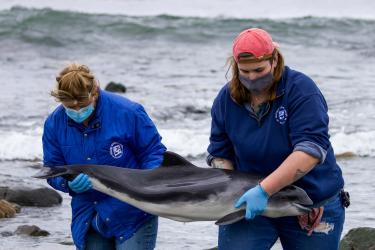
Lost Skulls and Latin: How Scientists Chose Names for Newly Identified Killer Whale Species

Pioneering Project to Restore Bull Kelp Forests in Greater Farallones National Marine Sanctuary in California

Last updated by Southwest Fisheries Science Center on April 03, 2024

Documenting the Elusive North Pacific Right Whale

Scientists Explore how Sardine Populations and Fisheries Harvest Control Rules May Respond to Climate Change

New Research Asks, “Can Pacific Salmon Keep Pace with Climate Change?”

Inbreeding: A Conservation Challenge for Iconic Killer Whales
Read our research on: Abortion | International Conflict | Election 2024
Regions & Countries
2. how teachers manage their workload.
The vast majority of teachers say there’s not enough time in the workday to accomplish all that’s expected of them. Some 84% say they don’t have enough time during their regular work hours to do tasks like grading, lesson planning, paperwork and answering emails.
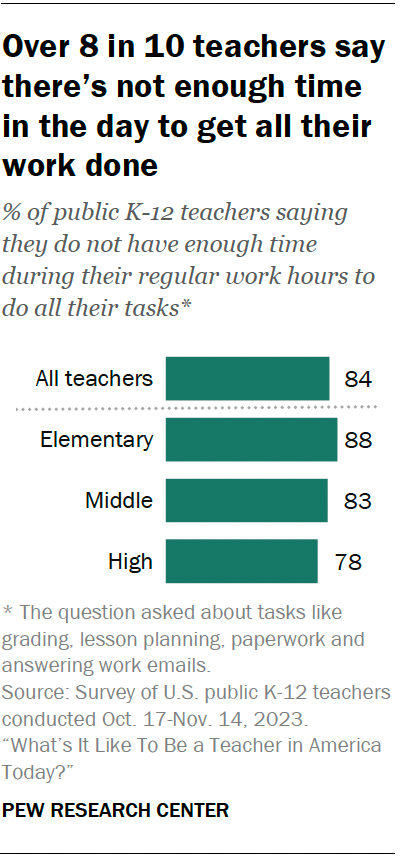
Reasons it’s so hard to get everything done during the workday
We asked teachers who say they don’t have enough time to get all their work done in their regular work hours about some of the possible underlying causes.
Most say simply having too much work is a major reason they don’t have enough time to get everything done.
Smaller shares say these factors are major reasons:
- Often having to perform non-teaching duties such as hallway or lunch duty (24%)
- Often spending time helping students outside class time (22%)
- Often having to cover for another teacher’s class when they aren’t available (16%)
Shares ranging from 51% to 72% say each of these is at least a minor reason they don’t have enough time to get all their work done during regular work hours.
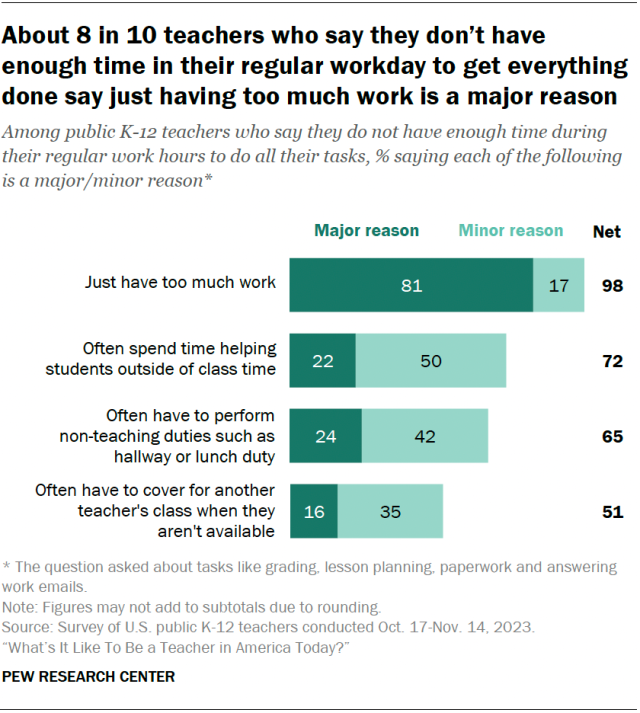
Staffing issues
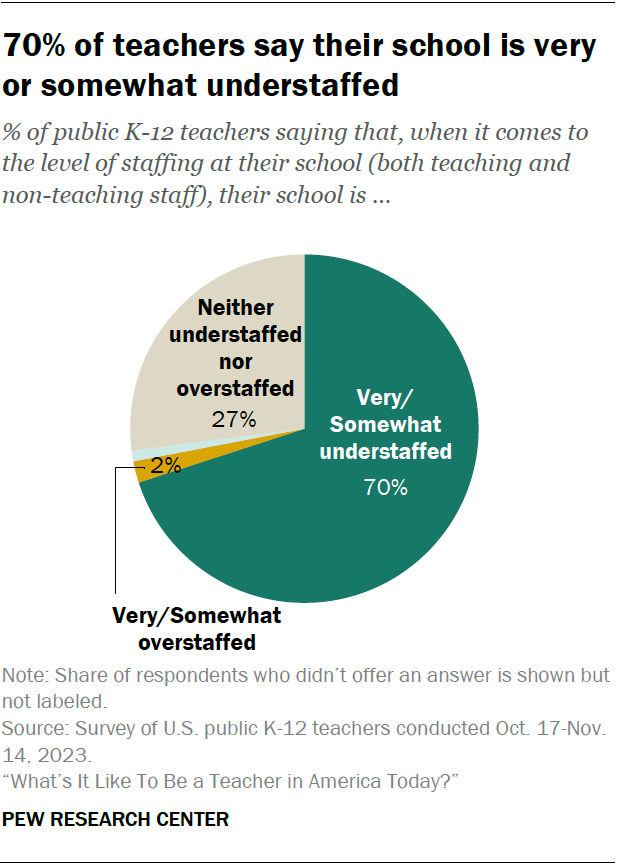
Staffing shortages in K-12 public schools have been widely reported. These shortages extend from classroom teachers to non-teaching staff. Seven-in-ten public K-12 teachers say their school is understaffed, with 15% saying it’s very understaffed and 55% saying it’s somewhat understaffed.
This pattern is consistent across elementary, middle and high schools.
Teachers in medium-poverty schools (18%) and high-poverty schools (19%) are more likely than those in low-poverty schools (11%) to say their school is very understaffed.
Balancing work and personal life
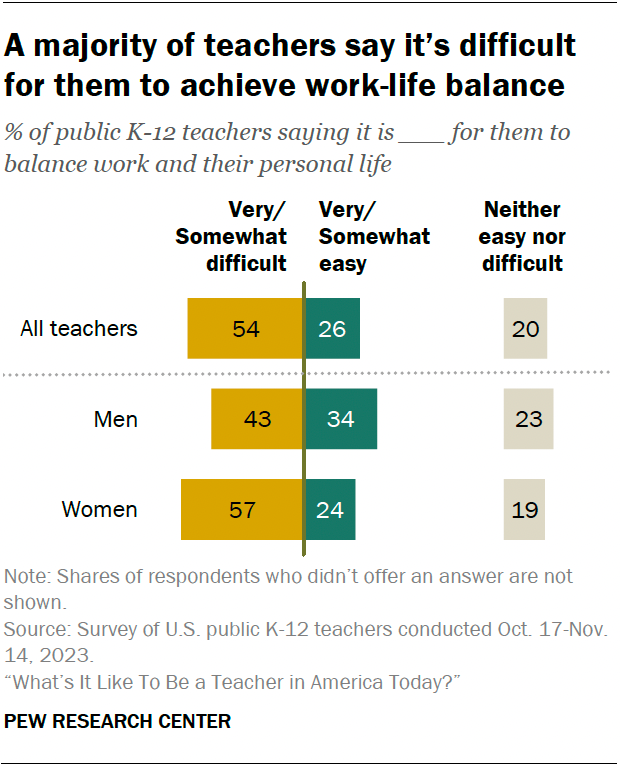
Given all of these challenges, it’s not surprising that a majority of teachers (54%) say it’s difficult for them to balance work and their personal life – 16% say this is very difficult, and 37% say it’s somewhat difficult.
About one-in-four say it’s very easy (6%) or somewhat easy (20%) for them to balance work and their personal life. And 20% say it’s neither easy nor difficult.
Work-life balance is more difficult for teachers who are women than for those who are men (57% vs. 43% say this is very or somewhat difficult).
How teachers experience their jobs
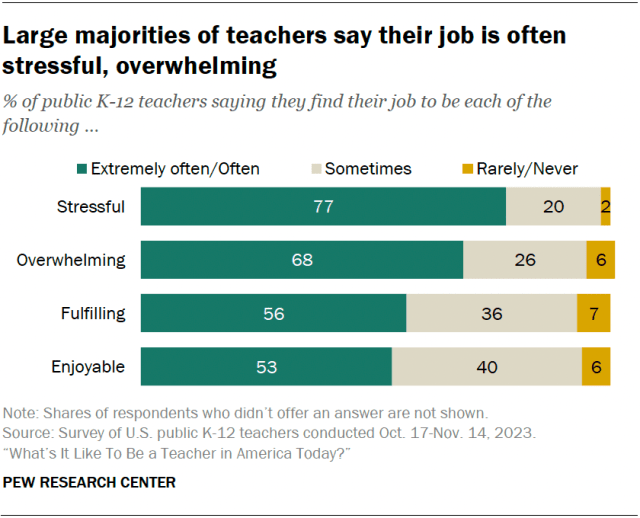
Large majorities of teachers say they find their job to be stressful (77%) and overwhelming (68%) extremely often or often.
Smaller majorities say their job is frequently fulfilling (56%) or enjoyable (53%).
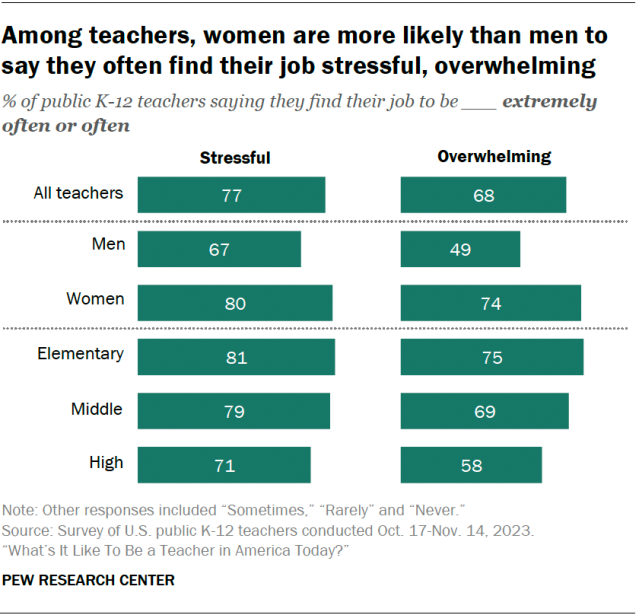
Among teachers, women are more likely than men to say their job is frequently stressful or overwhelming. For example, 74% of women teachers say they find teaching to be overwhelming extremely often or often, compared with 49% of men.
Feeling stressed or overwhelmed is also more common among elementary and middle school teachers than among high school teachers.
When it comes to experiencing positive emotions, teachers who are newer to the profession are more likely than those with longer tenures to say they frequently find their job to be fulfilling.
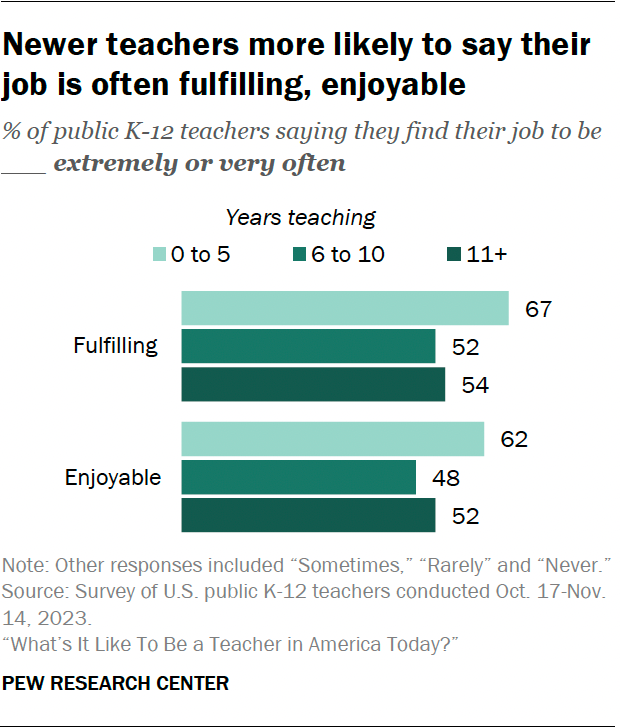
Among those who’ve been teaching for less than six years, 67% say their job is fulfilling extremely often or often. This compares with 52% among those who’ve been teaching for six to 10 years, and 54% among those with more than 10 years of teaching experience.
Newer teachers are also more likely than those who’ve been in the profession for more than 10 years to say they frequently find their job to be enjoyable.
Social Trends Monthly Newsletter
Sign up to to receive a monthly digest of the Center's latest research on the attitudes and behaviors of Americans in key realms of daily life
Report Materials
Table of contents, ‘back to school’ means anytime from late july to after labor day, depending on where in the u.s. you live, among many u.s. children, reading for fun has become less common, federal data shows, most european students learn english in school, for u.s. teens today, summer means more schooling and less leisure time than in the past, about one-in-six u.s. teachers work second jobs – and not just in the summer, most popular.
About Pew Research Center Pew Research Center is a nonpartisan fact tank that informs the public about the issues, attitudes and trends shaping the world. It conducts public opinion polling, demographic research, media content analysis and other empirical social science research. Pew Research Center does not take policy positions. It is a subsidiary of The Pew Charitable Trusts .

IMAGES
VIDEO
COMMENTS
Research Topic. Definition: Research topic is a specific subject or area of interest that a researcher wants to investigate or explore in-depth through research. It is the overarching theme or question that guides a research project and helps to focus the research activities towards a clear objective.
113 Great Research Paper Topics. One of the hardest parts of writing a research paper can be just finding a good topic to write about. Fortunately we've done the hard work for you and have compiled a list of 113 interesting research paper topics. They've been organized into ten categories and cover a wide range of subjects so you can easily ...
Select a topic. Choosing an interesting research topic is your first challenge. Here are some tips: Choose a topic that you are interested in! The research process is more relevant if you care about your topic. Narrow your topic to something manageable. If your topic is too broad, you will find too much information and not be able to focus.
A research topic and a research problem are two distinct concepts that are often confused. A research topic is a broader label that indicates the focus of the study, while a research problem is an issue or gap in knowledge within the broader field that needs to be addressed.. To illustrate this distinction, consider a student who has chosen "teenage pregnancy in the United Kingdom" as ...
Conceptualizing a research topic entails formulating a "defensible and researchable" research question. Conducting a literature search as one of the first steps in a graduate degree is often quite helpful as published peer-reviewed research articles are key to identify knowledge gaps in current literature. Thus, students can design and ...
Step 1: Choose your topic. First you have to come up with some ideas. Your thesis or dissertation topic can start out very broad. Think about the general area or field you're interested in—maybe you already have specific research interests based on classes you've taken, or maybe you had to consider your topic when applying to graduate school and writing a statement of purpose.
This is NOT a guide to help you research a topic. It is only intended to provide ideas for a paper. The ability to develop a good research topic is an important skill. An instructor may assign you a specific topic, but most often instructors require you to select your own topic of interest. When deciding on a topic, there are a few things that ...
Choose a research paper topic. Conduct preliminary research. Develop a thesis statement. Create a research paper outline. Write a first draft of the research paper. Write the introduction. Write a compelling body of text. Write the conclusion. The second draft.
A research topic is a well-defined subject the researcher is interested in. Rational thinking and creative techniques are two methods you can use to generate research ideas. Techniques to find good research topics include brainstorming, getting inspiration from your teachers, using relevance trees, doing a literature search or looking inwards.
3. Start broad and narrow your focus. Once you have a general topic that interests you, begin by reading widely about it. Write down the ideas, information, and sources that interest you the most. Then, review your notes to start refining your topic into a precise, narrow research focus. [3]
A good research topic will have a body of related research which is accessible and manageable. Identifying a topic with these characteristics at the beginning of the research process will ultimately save you time. Finding a research topic that is interesting, relevant, feasible, and worthy of your time may take substantial effort so you should ...
Step 1: Consider a Topic that Interests You. If your professor has asked you to choose a topic for your research paper, it means you can choose just about any subject to focus on in your area of study. A significant first step to take is to consider topics that interest you. An interesting topic should meet two very important conditions.
The list provides 1000+ topic ideas across 25 research areas, including: Accounting & finance. Artificial intelligence (AI) and machine learning. Biotech and genetic engineering. Blockchain and crypto. Business, management and leadership. Communication. Cybersecurity. Data science and analytics.
Table of contents. Step 1: Introduce your topic. Step 2: Describe the background. Step 3: Establish your research problem. Step 4: Specify your objective (s) Step 5: Map out your paper. Research paper introduction examples. Frequently asked questions about the research paper introduction.
Identifying a research topic can be challenging. Most of the research that has been completed on the process of conducting research fails to examine the preliminary stages of the interactive and self-reflective process of identifying a research topic (Wintersberger & Saunders, 2020).
Before diving into how to choose a research topic, it is important to think about what are some elements of a good research topic. Of course, this will depend specifically on your research project, but a good research topic will always: Relate to the assignment itself. Even when you have a choice for your research topic, you still want to make ...
To research a topic, you should use scholarly articles, books, and authoritative webpages, since they'll offer the most reliable information. You can find good sources by searching for keywords related to your topic online or using an academic database. For example, if your topic is about saving wild tigers, you could include keywords like ...
Define a Topic. Effective research takes time. This page will help students: Understand assignment requirements. Select a topic for their research paper. Formulate a research question. Narrow or broaden a research question. Determine keywords and brainstorm search terms. If you are unsure about what is expected about your assignment, consult ...
Research Topics . All Publications Methods Short Reads Tools & Resources Experts About. ... About Pew Research Center Pew Research Center is a nonpartisan fact tank that informs the public about the issues, attitudes and trends shaping the world. It conducts public opinion polling, demographic research, media content analysis and other ...
To develop a suitable education-related research topic, you'll need to identify a clear and convincing research gap, and a viable plan of action to fill that gap. If this sounds foreign to you, check out our free research topic webinar that explores how to find and refine a high-quality research topic, from scratch.
Microsoft Word - topic.doc. DEVELOPING A RESEARCH TOPIC. Every good research project has a well-defined topic. Selecting and developing a topic is an ongoing process by which you define and refine your ideas. You can then focus your research strategies to find relevant and appropriate information. Before you begin the research process, be sure ...
Answer: A research topic is a specific part of study in a broader area of study. For instance, for your research topic, the broader research area is malaria prevention in households. A research question aims to further narrow down the scope of the study. It is a possibility you explore through your study aiming to solve the problem of your ...
The Research and Scholarship Group, chaired by John Shaw, vice provost for research, Harry C. Dudley Professor of Structural and Economic Geology in the Earth and Planetary Sciences Department, and professor of environmental science and engineering in the Paulson School of Engineering and Applied Science. It focuses on how to enable, and ...
A new program in the MIT Department of Economics will support predoctoral research fellows working with the department's junior faculty. Thanks to the new program, predoc Wonjoon Choi (right) will be able to extend his contract with Tobias Salz (left), the Castle Krob Career Development Associate Professor of Economics.
Resident killer whales maintain tight-knit family pods and prey on salmon and other marine fish. Bigg's killer whales roam in smaller groups, preying on other marine mammals such as seals and whales. (Killer whales actually belong to the dolphin family.) Bigg's killer whales, sometimes called transients, are named for Canadian scientist ...
Seven-in-ten public K-12 teachers say their school is understaffed, with 15% saying it's very understaffed and 55% saying it's somewhat understaffed. This pattern is consistent across elementary, middle and high schools. Teachers in medium-poverty schools (18%) and high-poverty schools (19%) are more likely than those in low-poverty schools ...
Eighteen George Mason University programs are ranked the best in Virginia in a new report by EduRank that focuses on performance in research. Students enjoy the cherry blossoms on the Fairfax Campus. Photo by Eduardo de Souza/Office of University Branding. Topping the list is Mason's entrepreneurship ecosystem, which for the second ...